Timeline of women in science
This is a timeline of women in science, spanning from ancient history up to the 21st century. While the timeline primarily focuses on women involved with natural sciences such as astronomy, biology, chemistry and physics, it also includes women from the social sciences (e.g. sociology, psychology) and the formal sciences (e.g. mathematics, computer science), as well as notable science educators and medical scientists. The chronological events listed in the timeline relate to both scientific achievements and gender equality within the sciences.

"A Female Scientist", in Women’s Illustrated, Japan, 1939
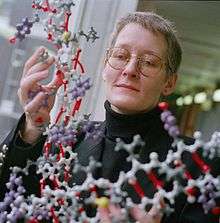
Teresa K. Attwood, Professor of Bioinformatics
Ancient history
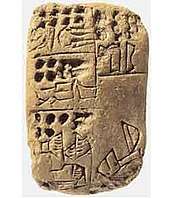
The Tapputi Belatekallim tablet
- c. 2700 BCE: In Ancient Egypt, Merit-Ptah practised medicine in the pharaoh's court.[1]
- 1900 BCE: Aganice, also known as Athyrta, was an Egyptian princess during the Middle Kingdom (about 2000–1700 BCE) working on astronomy and natural philosophy.[2]
- c. 1500 BCE: Hatshepsut, also known as the Queen Doctor, promoted a botanical expedition searching for officinal plants.[2]
- 1200 BCE: The Mesopotamian perfume-maker Tapputi-Belatekallim was referenced in the text of a cuneiform tablet. She is often considered the world's first recorded chemist.[3]
- 500 BC: Theano was a Pythagorean philosopher.
- c. 150 BCE: Aglaonice became the first female astronomer to be recorded in Ancient Greece.[4][5]
- 1st century BCE: A woman known only as Fang became the earliest recorded Chinese woman alchemist. She is credited with "the discovery of how to turn mercury into silver" – possibly the chemical process of boiling off mercury in order to extract pure silver residue from ores.[6]
- 1st century CE: Mary the Jewess was among the world's first alchemists.[7]
- c. 300–350 CE: Greek mathematician Pandrosion develops a numerical approximation for cube roots.[8]
- c. 355–415 CE: Greek astronomer, mathematician and philosopher Hypatia became renowned as a respected teacher and commentator on the sciences.[9]
- 3rd century CE: Cleopatra the Alchemist, an early figure in chemistry and practical alchemy, is credited as inventing the alembic.[10]
Middle Ages
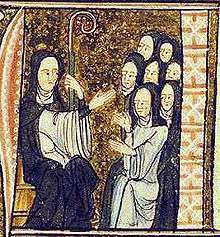
Hildegard of Bingen and her nuns
- c. 975 CE: Chinese alchemist Keng Hsien-Seng was employed by the Royal Court. She distilled perfumes, utilized an early form of the Soxhlet process to extract camphor into alcohol, and gained recognition for her skill in using mercury to extract silver from ores.[6][11]
- 10th century: Astronomer Mariam al-Asturlabi developed and manufactured astrolabes for the court of Sayf al-Dawla in Aleppo.[12]
- early 12th century: Dobrodeia of Kiev (died 1131), a Rus' princess, was the first woman to write a treatise on medicine.[13]
- Early 12th century: The Italian medical practitioner Trota of Salerno compiled medical works on women's ailments and skin diseases.[14]
- 12th century: Adelle of the Saracens taught at the Salerno School of Medicine.[15]
- 12th century: Hildegard of Bingen (1098–1179) was a founder of scientific natural history in Germany.[16]
- 1159: The Alsatian nun Herrad of Landsberg (1130–1195) compiled the scientific compendium Hortus deliciarum.[17]
- 1220s: Zulema the Astrologist was a Muslim astronomer in Medina Mayurqa.[18]
- Early 14th century: Adelmota of Carrara was a physician in Padua, Italy.[19]
16th century

Danish scientist Sophia Brahe
- 1561: Italian alchemist Isabella Cortese published her popular book The Secrets of Lady Isabella Cortese. The work included recipes for medicines, distilled oils and cosmetics, and was the only book published by a female alchemist in the 16th century.[20]
- 1572: Italian botanist Loredana Marcello died from the plague – but not before developing several effective palliative formulas for plague sufferers, which were used by many physicians.[21][22]
- 1572: Danish scientist Sophia Brahe (1556–1643) assisted her brother Tycho Brahe with his astronomical observations.[23]
- 1590: After her husband's death, Caterina Vitale took over his position as chief pharmacist to the Order of St John, becoming the first woman chemist and pharmacist in Malta.[24][25]
17th century
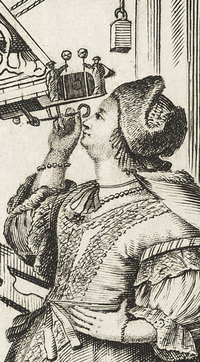
German–Polish astronomer Elisabetha Koopman Hevelius

German entomologist Maria Sibylla Merian
- 1609: French midwife Louise Bourgeois Boursier became the first woman to write a book on childbirth practices.[26]
- 1636: Anna Maria van Schurman is the first woman ever to attend university lectures.[27] She had to sit behind a screen so that her male fellow students would not see her.
- 1642: Martine Bertereau, the first recorded woman mineralogist, was imprisoned in France on suspicion of witchcraft. Bertereau had published two written works on the science of mining and metallurgy before being arrested.[6]
- 1650: Silesian astronomer Maria Cunitz published Urania Propitia, a work that both simplified and substantially improved Johannes Kepler's mathematical methods for locating planets. The book was published in both Latin and German, an unconventional decision that made the scientific text more accessible for non-university educated readers.[28]
- 1656: French chemist and alchemist Marie Meurdrac published her book La Chymie Charitable et Facile, en Faveur des Dames (Useful and Easy Chemistry, for the Benefit of Ladies).[29]
- 1668: After separating from her husband, French polymath Marguerite de la Sablière established a popular salon in Paris. Scientists and scholars from different countries visited the salon regularly to discuss ideas and share knowledge, and Sablière studied physics, astronomy and natural history with her guests.[30]
- 1680: French astronomer Jeanne Dumée published a summary of arguments supporting the Copernican theory of heliocentrism. She wrote "between the brain of a woman and that of a man there is no difference".[31]
- 1685: Frisian poet and archaeologist Titia Brongersma supervised the first excavation of a dolmen in Borger, Netherlands. The excavation produced new evidence that the stone structures were graves constructed by prehistoric humans – rather than structures built by giants, which had been the prior common belief.[32]
- 1690: German-Polish astronomer Elisabetha Koopman Hevelius, widow of Johannes Hevelius, whom she had assisted with his observations (and, probably, computations) for over twenty years, published in his name Prodromus Astronomiae, the largest and most accurate star catalog to that date.[33]
- 1693–1698: German astronomer and illustrator Maria Clara Eimmart created more than 350 detailed drawings of the moon phases.[34]
- 1699: German entomologist Maria Sibylla Merian, the first scientist to document the life cycle of insects for the public, embarked on a scientific expedition to Suriname, South America. She subsequently published Metamorphosis insectorum Surinamensium, a groundbreaking illustrated work on South American plants, animals and insects.[35]
18th century
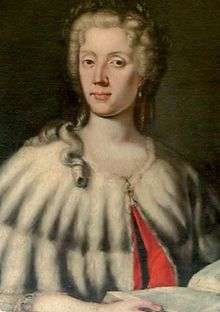
Italian physicist Laura Bassi
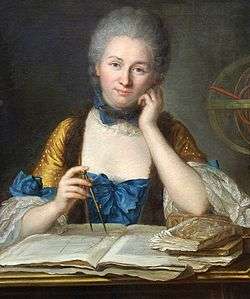
French polymath Émilie du Châtelet
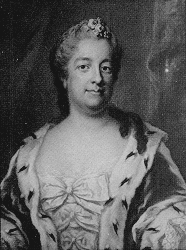
Swedish agronomist Eva Ekeblad
- 1702: Pioneering English entomologist Eleanor Glanville captured a butterfly specimen in Lincolnshire, which was subsequently named the Glanville fritillary in her honour. Her extensive butterfly collection impressed fellow entomologist William Vernon, who called Glanville's work "the noblest collection of butterflies, all English, which has sham'd us". Her butterfly specimens became part of early collections in the Natural History Museum.[36][37]
- 1702: German astronomer Maria Kirch became the first woman to discover a comet.[38]
- c. 1702–1744: In Montreal, Canada, French botanist Catherine Jérémie collected plant specimens and studied their properties, sending the specimens and her detailed notes back to scientists in France.[39]
- 1732: At the age of 20, Italian physicist Laura Bassi became the first female member of the Bologna Academy of Sciences. One month later, she publicly defended her academic theses and received a PhD. Bassi was awarded an honorary position as professor of physics at the University of Bologna. She was the first female physics professor in the world.[40]
- 1738: French polymath Émilie du Châtelet became the first woman to have a paper published by the Paris Academy, following a contest on the nature of fire.[41]
- 1740: French polymath Émilie du Châtelet published Institutions de Physique (Foundations of Physics) providing a metaphysical basis for Newtonian physics.[42]
- 1748: Swedish agronomist Eva Ekeblad became the first woman member of the Royal Swedish Academy of Sciences. Two years earlier, she had developed a new process of using potatoes to make flour and alcohol, which subsequently lessened Sweden's reliance on wheat crops and decreased the risk of famine.[43]
- 1751: 19-year-old Italian physicist Cristina Roccati received her PhD from the University of Bologna.[44]
- 1753: Jane Colden, an American, was the only female biologist mentioned by Carl Linnaeus in his masterwork Species Plantarum.[45]
- 1755: After the death of her husband, Italian anatomist Anna Morandi Manzolini took his place at the University of Bologna, becoming a professor of anatomy and establishing an internationally known laboratory for anatomical research.[46]
- 1757: French astronomer Nicole-Reine Lepaute worked with mathematicians Alexis Clairaut and Joseph Lalande to calculate the next arrival of Halley's Comet.[47]
- 1760: American horticulturalist Martha Daniell Logan began corresponding with botanic specialist and collector John Bartram, regularly exchanging seeds, plants and botanical knowledge with him.[48]
- 1762: French astronomer Nicole-Reine Lepaute calculated the time and percentage of a solar eclipse that had been predicted to occur in two years time. She created a map to show the phases, and published a table of her calculations in the 1763 edition of Connaissance des Temps.[47]
- 1766: French chemist Geneviève Thiroux d'Arconville published her study on putrefaction. The book presented her observations from more than 300 experiments over the span of five years, during which she attempted to discover factors necessary for the preservation of beef, eggs, and other foods. Her work was recommended for royal privilege by fellow chemist Pierre-Joseph Macquer.[49]
- 1776: At the University of Bologna, Italian physicist Laura Bassi became the first woman appointed as chair of physics at a university.[40]
- 1776: Christine Kirch received a respectable salary of 400 Thaler for calendar-making. See also her sister Margaretha Kirch
- 1782–1791: French chemist and mineralogist Claudine Picardet translated more than 800 pages of Swedish, German, English and Italian scientific papers into French, enabling French scientists to better discuss and utilize international research in chemistry, mineralogy and astronomy.[50]
- c. 1787–1797: Self-taught Chinese astronomer Wang Zhenyi published at least twelve books and multiple articles on astronomy and mathematics. Using a lamp, a mirror and a table, she once created a famous scientific exhibit designed to accurately simulate a lunar eclipse.[51][52]
- 1789: French astronomer Louise du Pierry, the first Parisian woman to become an astronomy professor, taught the first astronomy courses specifically open to female students.[53]
- 1794: Scottish chemist Elizabeth Fulhame invented the concept of catalysis and published a book on her findings.[54]
- c. 1796–1820: During the reign of the Jiaqing Emperor, astronomer Huang Lü became the first Chinese woman to work with optics and photographic images. She developed a telescope that could take simple photographic images using photosensitive paper.[51]
- 1797: English science writer and schoolmistress Margaret Bryan published A Compendious System of Astronomy, including an engraving of herself and her two daughters. She dedicated the book to her students.[55]
Early 19th century
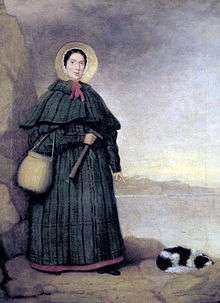
English paleontologist Mary Anning
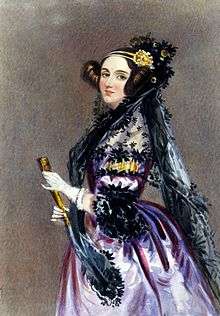
English mathematician and computer programmer Ada Lovelace
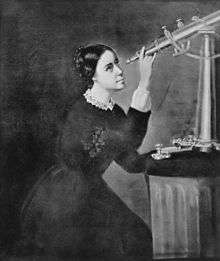
American astronomer Maria Mitchell
- 1808: Anna Sundström began assisting Jacob Berzelius in his laboratory, becoming one of the first Swedish women chemists.[56]
- 1815: English archaeologist Lady Hester Stanhope used a medieval Italian manuscript to locate a promising archaeological site in Ashkelon, becoming the first archaeologist to begin an excavation in the Palestinian region. It was one of the earliest examples of the use of textual sources in field archaeology.[57]
- 1816: French mathematician and physicist Sophie Germain became the first woman to win a prize from the Paris Academy of Sciences for her work on elasticity theory.[58]
- 1823: English palaeontologist and fossil collector Mary Anning discovered the first complete Plesiosaurus.[41]
- 1831: Italian botanist Elisabetta Fiorini Mazzanti published her best-known work Specimen Bryologiae Romanae.[59]
- 1830–1837: Belgian botanist Marie-Anne Libert published her four-volume Plantae cryptogamicae des Ardennes, a collection of 400 species of mosses, ferns, lichen, algae and fungi from the Ardennes region. Her contributions to systemic cryptogamic studies were formally recognized by Prussian emperor Friedrich Wilhelm III, and Libert received a gold medal of merit.[60]
- 1832: French marine biologist Jeanne Villepreux-Power invented the first glass aquarium, using it to assist in her scientific observations of Argonauta argo.[61]
- 1833: English phycologists Amelia Griffiths and Mary Wyatt published two books on local British seaweeds. Griffiths had an internationally respected reputation as a skilled seaweed collector and scholar, and Swedish botanist Carl Agardh had earlier named the seaweed genus Griffithsia in her honour.[62]
- 1835: Scottish polymath Mary Somerville and German astronomer Caroline Herschel were elected the first female members of the Royal Astronomical Society.[63][64]
- 1836: Early English geologist and paleontologist Etheldred Benett, known for her extensive collection of several thousand fossils, was appointed a member of the Natural History Society of Moscow. The society – which only admitted men at the time – initially mistook Benett for a man due to her reputation as a scientist and her unusual first name, addressing her diploma of admission to "Dominum" (Master) Benett.[65][66]
- 1840: Scottish fossil collector and illustrator Lady Eliza Maria Gordon-Cumming invited geologists Louis Agassiz, William Buckland and Roderick Murchison to examine her collection of fish fossils. Agassiz confirmed several of Gordon-Cumming's discoveries as new species.[67]
- 1843: During a nine-month period in 1842–43, English mathematician Ada Lovelace translated Luigi Menabrea's article on Charles Babbage's newest proposed machine, the Analytical Engine. With the article, she appended a set of notes.[68] Her notes were labelled alphabetically from A to G. In note G, she describes an algorithm for the Analytical Engine to compute Bernoulli numbers. It is considered the first published algorithm ever specifically tailored for implementation on a computer, and Ada Lovelace has often been cited as the first computer programmer for this reason.[69][70] The engine was never completed, so her program was never tested.[71]
- 1843: British botanist and pioneering photographer Anna Atkins self-published her book Photographs of British Algae, illustrating the work with cyanotypes. Her book was the first book on any subject to be illustrated by photographs.[72]
- 1846: British zoologist Anna Thynne built the first stable, self-sustaining marine aquarium.[73]
- 1848: American astronomer Maria Mitchell became the first woman elected to the American Academy of Arts and Sciences; she had discovered a new comet the year before.[74]
- 1848–1849: English scientist Mary Anne Whitby, a pioneer in western silkworm cultivation, collaborated with Charles Darwin in researching the hereditary qualities of silkworms.[75][76]
- 1850: The American Association for the Advancement of Sciences accepted its first women members: astronomer Maria Mitchell, entomologist Margaretta Morris, and science educator Almira Hart Lincoln Phelps.[77]
Late 19th century

Welsh astronomer Thereza Dillwyn Llewelyn

Russian scientist Sofia Kovalevskaya
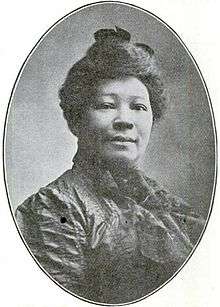
American chemist Josephine Silone-Yates

British mathematician Philippa Fawcett

American geologist Florence Bascom
- 1854–1855: Florence Nightingale organized care for wounded soldiers during the Crimean War. She was an English social reformer and statistician, and the founder of modern nursing.
- 1855: Working with her father, Welsh astronomer and photographer Thereza Dillwyn Llewelyn produced some of the earliest photographs of the moon.[78]
- 1856: American atmospheric scientist Eunice Newton Foote presented her paper "Circumstances affecting the heat of the sun's rays" at an annual meeting of the American Association for the Advancement of Sciences. She was an early researcher of the greenhouse effect.[79]
- 1862: Belgian botanist Marie-Anne Libert became the first woman to join the Royal Botanical Society of Belgium. She was named an honorary member.[60]
- 1863: German naturalist Amalie Dietrich arrived in Australia to collect plant, animal and anthropological specimens for the German Godeffroy Museum. She remained in Australia for the next decade, discovering a number of new plant and animal species in the process, but also became notorious in later years for her removal of Aboriginal skeletons – and the possible incitement of violence against Aboriginal people – for anthropological research purposes.[80][81]
- 1865: English geologist Elizabeth Carne was elected the first female Fellow of the Royal Geological Society of Cornwall.[82]
1870s
- 1869/1870: American beekeeper Ellen Smith Tupper became the first female editor of an entomological journal.[83]
- 1870: Ellen Swallow Richards became the first American woman to earn a degree in chemistry.[84]
- 1870: Russian chemist Anna Volkova became the first woman member of the Russian Chemical Society.[85]
- 1874: Julia Lermontova became the first Russian woman to receive a PhD in chemistry.[85]
- 1875: Hungarian archaeologist Zsófia Torma excavated the site of Turdaș-Luncă in Hunedoara County, today in Romania. The site, which uncovered valuable prehistoric artifacts, became one of the most important archaeological discoveries in Europe.[86]
- 1876–1878: American naturalist Mary Treat studied insectivorous plants in Florida. Her contributions to the scientific understanding of how these plants caught and digested prey were acknowledged by Charles Darwin and Asa Gray.[87]
- 1878: English entomologist Eleanor Anne Ormerod became the first female Fellow of the Royal Meteorological Society. A few years afterwards, she was appointed as Consulting Entomologist to the Royal Agricultural Society.[88][89]
1880s
- 1880: Self-taught German chemist Agnes Pockels began investigating surface tension, becoming a pioneering figure in the field of surface science. The measurement equipment she developed provided the basic foundation for modern quantitative analyses of surface films.[90]
- 1883: American ethnologist Erminnie A. Smith, the first woman field ethnographer, published her collection of Iroquois legends Myths of the Iroquois.[91]
- 1884: English zoologist Alice Johnson's paper on newt embryos became the first paper authored by a woman to appear in the Proceedings of the Royal Society.[92]
- 1885: British naturalist Marian Farquharson became the first female Fellow of the Royal Microscopical Society.[93]
- 1886: Botanist Emily Lovira Gregory became the first woman member of the American Society of Naturalists.[94]
- 1887: Rachel Lloyd became the first American woman to receive a PhD in chemistry, completing her research at the Swiss University of Zurich.[95]
- 1888: Russian scientist Sofia Kovalevskaya discovered the Kovalevskaya top, one of a brief list of known rigid body motion examples that are tractable by manipulating equations by hand.[96][97]
- 1888: American chemist Josephine Silone Yates was appointed head of the Department of Natural Sciences at Lincoln Institute (later Lincoln University), becoming the first black woman to head a college science department.[98][99]
- 1889: Geologist Mary Emilie Holmes became the first female Fellow of the Geological Society of America.[100]
1890s
- 1890: Austrian-born chemist Ida Freund became the first woman to work as a university chemistry lecturer in the United Kingdom. She was promoted to full lecturer at Newnham College, Cambridge.[101]
- 1890: Popular science educator and author Agnes Giberne co-founded the British Astronomical Association.[102] Subsequently, English astronomer Elizabeth Brown was appointed the Director of the association's Solar Section, well known for her studies in sunspots and other solar phenomena.[103]
- 1890: Mathematician Philippa Fawcett became the first woman to obtain the highest score in the Cambridge Mathematical Tripos examinations, a score "above the Senior Wrangler".[104] (At the time, women were ineligible to be named Senior Wrangler.)
- 1891: American-born astronomer Dorothea Klumpke was appointed as Head of the Bureau of Measurements at the Paris Observatory. For the next decade, in addition to completing her doctorate of science, she worked on the Carte du Ciel mapping project. She was recognized for her work with the first Prix de Dames award from the Société astronomique de France and named an Officier of the Paris Academy of Sciences.[105]
- 1892: American psychologist Christine Ladd-Franklin presented her evolutionary theory on the development of colour vision to the International Congress of Psychology. Her theory was the first to emphasize colour vision as an evolutionary trait.[106]
- 1893: Florence Bascom became the second woman to earn her Ph.D in geology in the United States, and the first woman to receive a Ph.D from Johns Hopkins University.[107][108] Geologists consider her to be the "first woman geologist in this country [America]".[109]
- 1893: American botanist Elizabeth Gertrude Britton became a charter member of the Botanical Society of America.[110]
- 1894: American astronomer Margaretta Palmer becomes the first woman to earn a doctorate in astronomy.[111]
- 1895: English physiologist Marion Bidder became the first woman to speak and present her own paper at a meeting of the Royal Society.[112]
- 1896: Florence Bascom became the first woman to work for the United States Geological Survey.[113][114]
- 1896: English mycologist and lichenologist Annie Lorrain Smith became a founding member of the British Mycological Society. She later served as president twice.[115][116]
- 1897: American cytologists and zoologists Katharine Foot and Ella Church Strobell started working as research partners. Together, they pioneered the practice of photographing microscopic research samples and invented a new technique for creating thin material samples in colder temperatures.[117]
- 1897: American physicist Isabelle Stone became the first woman to receive a PhD in physics in the United States. She wrote her dissertation "On the Electrical Resistance of Thin Films" at the University of Chicago.[118][119]
- 1898: Danish physicist Kirstine Meyer was awarded the gold medal of the Royal Danish Academy of Sciences and Letters.[120]
- 1898: Italian malacologist Marianna Paulucci donated her collection of specimens to the Royal Museum of Natural History in Florence, Italy (Museo di Storia Naturale di Firenze). Paulucci was the first scientist to compile and publish a species list of Italian malacofauna.[121]
- 1899: American physicists Marcia Keith and Isabelle Stone became charter members of the American Physical Society.[122][119]
- 1899: Irish physicist Edith Anne Stoney was appointed a physics lecturer at the London School of Medicine for Women, becoming the first woman medical physicist. She later became a pioneering figure in the use of X-ray machines on the front lines of World War I.[123]
Early 20th century
1900s

American geologist and geographer Zonia Baber
.jpg)
Italian physician and educator Maria Montessori
- 1900: American botanist Anna Murray Vail became the first librarian of the New York Botanical Garden. A key supporter of the institution's establishment, she had earlier donated her entire collection of 3000 botanical specimens to the garden.[124]
- 1900: Physicists Marie Curie and Isabelle Stone attended the first International Congress of Physics in Paris, France. They were the only two women out of 836 participants.[119]
- 1901: American Florence Bascom became the first female geologist to present a paper before the Geological Survey of Washington.[125]
- 1901: Czech botanist and zoologist Marie Zdeňka Baborová-Čiháková became the first woman in the Czech Republic to receive a PhD.[126]
- 1901: American astronomer Annie Jump Cannon published her first catalog of stellar spectra, which classified stars by temperature. This method was universally and permanently adopted by other astronomers.[127]
- 1903: Polish-born physicist and chemist Marie Curie became the first woman to receive a Nobel Prize when she received the Nobel Prize in Physics along with her husband, Pierre Curie, "for their joint researches on the radiation phenomena discovered by Professor Henri Becquerel", and Henri Becquerel, "for his discovery of spontaneous radioactivity".[128][129][130]
- 1904: American geographer, geologist and educator Zonia Baber published her article "The Scope of Geography", in which she laid out her educational theories on the teaching of geography. She argued that students required a more interdisciplinary, experiential approach to learning geography: instead of a reliance on textbooks, students needed field-trips, lab work and map-making knowledge. Baber's educational ideas transformed the way schools taught geography.[131]
- 1904: British chemists Ida Smedley, Ida Freund and Martha Whiteley organized a petition asking the Chemical Society to admit women as Fellows. A total of 19 female chemists became signatories, but their petition was denied by the society.[132]
- 1905: In January, the Linnean Society of London elected its first women Fellows. These initial women included horticulturalist Ellen Willmott, ornithologist Emma Turner, biologist Lilian Jane Gould, mycologists Gulielma Lister and Annie Lorrain Smith, and botanists Mary Anne Stebbing, Margaret Jane Benson and Ethel Sargant.[133]
- 1905: American geneticist Nettie Stevens discovered sex chromosomes.[134]
- 1906: Following the San Francisco earthquake, American botanist and curator Alice Eastwood rescued almost 1500 rare plant specimens from the burning California Academy of Sciences building. Her curation system of keeping type specimens separate from other collections – unconventional at the time – allowed her to quickly find and retrieve the specimens.[135]
- 1906: Russian chemist Irma Goldberg published a paper on two newly-discovered chemical reactions involving the presence of copper and the creation of a nitrogen-carbon bond to an aromatic halide. These reactions were subsequently named the Goldberg reaction and the Jourdan-Ullman-Goldberg reaction.[136]
- 1906: English physicist, mathematician and engineer Hertha Ayrton became the first female recipient of the Hughes Medal from the Royal Society of London. She received the award for her experimental research on electric arcs and sand ripples.[137]
- 1906: After her death, English lepidopterist Emma Hutchinson's collection of 20,000 butterflies and moths was donated to the London Natural History Museum. She had published little during her lifetime, and was barred from joining local scientific societies due to her gender, but was honoured for her work when a variant form of the Comma butterfly was named hutchinsoni.[138]
- 1909: Alice Wilson became the first female geologist hired by the Geological Survey of Canada.[139][140] She is widely credited as being the first Canadian woman geologist.[141]
- 1909: Danish physicist Kirstine Meyer became the first Danish woman to receive a doctorate degree in natural sciences. She wrote her dissertation on the topic of "the development of the temperature concept" within the history of physics.[120]
1910s
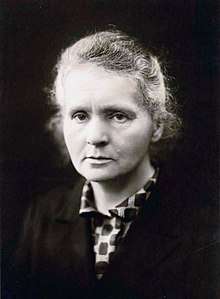
Polish-born physicist and chemist Marie Curie

American astronomer Henrietta Swan Leavitt
.png)
German physicist and mathematician Emmy Noether

Canadian geneticist Carrie Derick
- 1911: Polish-born physicist and chemist Marie Curie became the first woman to receive the Nobel Prize in Chemistry, which she received "[for] the discovery of the elements radium and polonium, by the isolation of radium and the study of the nature and compounds of this remarkable element".[142][143][144]
- 1911: Norwegian biologist Kristine Bonnevie became the first woman member of the Norwegian Academy of Science and Letters.[145]
- 1912: American astronomer Henrietta Swan Leavitt studied the bright-dim cycle periods of Cepheid stars, then found a way to calculate the distance from such stars to Earth.[142]
- 1912: Canadian botanist and geneticist Carrie Derick was appointed a professor of morphological botany at McGill University. She was the first woman to become a full professor in any department at a Canadian university.[146]
- 1913: Regina Fleszarowa became the first Polish woman to receive a PhD in natural sciences.[147]
- 1913: Izabela Textorisová, the first Slovakian woman botanist, published "Flora Data from the County of Turiec" in the journal Botanikai Közlemények. Her work uncovered more than 100 previously unknown species of plants from the Turiec area.[148]
- 1913: Canadian physician and chemist Maude Menten co-authored a paper on enzyme kinetics, leading to the development of the Michaelis–Menten kinetics equation.[149]
- 1914–1918: During World War I, a team of seven British women chemists conducted pioneering research on chemical antidotes and weaponized gases. The project leader, Martha Whiteley, was awarded the Order of the British Empire for her wartime contributions.[150]
- 1914: British-born mycologist Ethel Doidge became the first woman in South Africa to receive a doctorate in any subject, receiving her doctorate of science degree from the University of the Good Hope. She wrote her thesis on "A bacterial disease of mango".[151]
- 1916: Isabella Preston became the first female professional plant hybridist in Canada, producing the George C. Creelman trumpet lily. Her lily later received an Award of Merit from the Royal Horticultural Society.[152]
- 1916: Chika Kuroda became the first Japanese woman to earn a bachelor of science degree, studying chemistry at the Tohoku Imperial University. After graduation, she was subsequently appointed an assistant professor at the university.[153]
- 1917: American zoologist Mary J. Rathbun received her PhD from the George Washington University. Despite never having attended college – or any formal schooling beyond high school – Rathbun had authored more than 80 scientific publications, described over 674 new species of crustacean, and developed a system for crustacean-related records at the Smithsonian Museum.[154]
- 1917: Dutch biologist and geneticist Jantina Tammes became the first female university professor in the Netherlands. She was appointed an extraordinary professor of phytopathology at the University of Utrecht.[155]
- 1918: German physicist and mathematician Emmy Noether created Noether's theorem explaining the connection between symmetry and conservation laws.[156]
- 1919: Kathleen Maisey Curtis became the first New Zealand woman to earn a Doctorate of Science degree (DSc), completing her thesis on Synchytrium endobioticum (potato wart disease) at the Imperial College of Science and Technology. Her research was cited as "the most outstanding result in mycological research that had been presented for ten years".[157]
1920s
_(3).jpg)
British-American astronomer Cecilia Payne-Gaposchkin
Japanese biologist Kono Yasui
- 1920: Louisa Bolus was elected a Fellow of the Royal Society of South Africa for her contributions to botany. Over the course of her lifetime, Bolus identified and named more than 1,700 new South African plant species – more species than any other botanist in South Africa.[158]
- 1923: María Teresa Ferrari, an Argentine physician, earned the first diploma awarded to a woman by the Faculty of Medicine at the University of Paris for her studies of the urinary tract.[159]
- 1924: Florence Bascom became the first woman elected to the Council of the Geological Society of America.[125]
- 1925: Mexican-American botanist Ynes Mexia embarked on her first botanical expedition into Mexico, collecting over 1500 plant specimens. Over the course of the next thirteen years, Mexia collected more than 145,000 specimens from Mexico, Alaska, and multiple South American countries. She discovered 500 new species.[160]
- 1925: American medical scientist Florence Sabin became the first woman elected to the National Academy of Science.[161]
- 1925: British-American astronomer and astrophysicist Cecilia Payne-Gaposchkin established that hydrogen is the most common element in stars, and thus the most abundant element in the universe.[162]
- 1927: Kono Yasui became the first Japanese woman to earn a doctorate in science, studying at the Tokyo Imperial University and completing her thesis on "Studies on the structure of lignite, brown coal, and bituminous coal in Japan".[163]
- 1928: Alice Evans became the first woman elected president of the Society of American Bacteriologists.[164]
- 1928: Helen Battle became the first woman to earn a PhD in marine biology in Canada.[165]
- 1928: British biologist Kathleen Carpenter published the first English-language textbook devoted to freshwater ecology: Life in Inland Waters.[166]
- 1929: American botanist Margaret Clay Ferguson became the first woman president of the Botanical Society of America.[167]
- 1929: Scottish-Nigerian Agnes Yewande Savage became the first West African woman to graduate from medical school, obtaining her degree at the University of Edinburgh.[168][169][170]
1930s
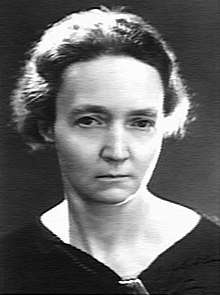
French chemist Irène Joliot-Curie
%2C_lecturing_at_Catholic_University%2C_Washington%2C_D.C.%2C_1946.jpg)
Austrian-Swedish physicist Lise Meitner
- 1930: Concepción Mendizábal Mendoza became the first woman in Mexico to earn a civil engineering degree.[171]
- 1932: Michiyo Tsujimura became the first Japanese woman to earn a doctorate in agriculture. She studied at the Tokyo Imperial University, and her doctoral thesis was entitled "On the Chemical Components of Green Tea".[172]
- 1933: Hungarian scientist Elizabeth Rona received the Haitinger Prize from the Austrian Academy of Sciences for her method of extracting polonium.[173][174]
- 1933: American bacteriologist Ruth Ella Moore became the first African-American woman to receive a PhD in the natural sciences, completing her doctorate in bacteriology at Ohio State University.[175]
- 1935: French chemist Irène Joliot-Curie received the Nobel Prize in Chemistry along with Frédéric Joliot-Curie "for their synthesis of new radioactive elements".[176]
- 1935: American plant hybridist Grace Sturtevant, the "First Lady of Iris", received the American Iris Society's Gold Medal for her lifetime's work.[177]
- 1936: Edith Patch became the first female president of the Entomological Society of America.[178]
- 1936: Mycologist Kathleen Maisey Curtis was elected the first female Fellow at the Royal Society of New Zealand.[157][179]
- 1936: Danish seismologist and geophysicist Inge Lehmann discovered that the Earth has a solid inner core distinct from its molten outer core.[180]
- 1937: Canadian forensic pathologist Frances Gertrude McGill assisted the Royal Canadian Mounted Police in establishing their first forensic detection laboratory.[181]
- 1937: Suzanne Comhaire-Sylvain became the first female Haitian anthropologist and the first Haitian person to complete a PhD, receiving her doctoral degree from the University of Paris.[182][183][184]
- 1937: Marietta Blau and her student Hertha Wambacher, both Austrian physicists, received the Lieben Prize of the Austrian Academy of Sciences for their work on cosmic ray observations using the technique of nuclear emulsions.[185][186]
- 1938: Elizabeth Abimbola Awoliyi became the first woman to be licensed to practise medicine in Nigeria after graduating from the University of Dublin and the first West African female medical officer with a license of the Royal Surgeon (Dublin).[187][188][189][190]
- 1938: Geologist Alice Wilson became the first woman appointed as Fellow to the Royal Society of Canada.[141]
- 1938: South African naturalist Marjorie Courtenay-Latimer discovered a living coelacanth fish caught near the Chalumna river. The species had been believed to be extinct for over 60 million years. It was named latimeria chalumnae in her honour.[191]
- 1939: Austrian-Swedish physicist Lise Meitner, along with Otto Hahn, led the small group of scientists who first discovered nuclear fission of uranium when it absorbed an extra neutron; the results were published in early 1939.[192][193]
- 1939: French physicist Marguerite Perey discovered francium.[194]
1940s
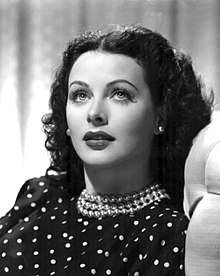
Actress and inventor Hedy Lamarr
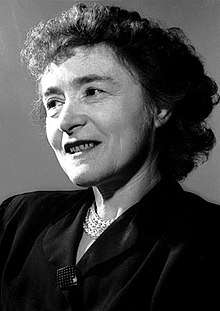
Austrian-American biochemist Gerty Cori
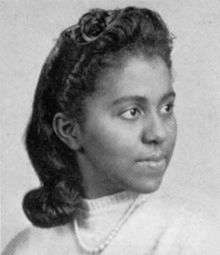
American biochemist Marie Maynard Daly
- 1940: Turkish Archaeologist, Sumerologist, Assyriologist, and writer Muazzez İlmiye Çığ. Upon receiving her degree in 1940, she began a multi-decade career at Museum of the Ancient Orient, one of three such institutions comprising Istanbul Archaeology Museums, as a resident specialist in the field of cuneiform tablets, thousands of which were being stored untranslated and unclassified in the facility's archives. In the intervening years, due to her efforts in the deciphering and publication of the tablets, the Museum became a Middle Eastern languages learning center attended by ancient history researchers from every part of the world.[195]
- 1941: American scientist Ruth Smith Lloyd became the first African-American woman to receive a PhD in anatomy.[196]
- 1942: Austrian-American actress and inventor Hedy Lamarr and composer George Antheil developed a radio guidance system for Allied torpedoes that used spread spectrum and frequency hopping technology to defeat the threat of jamming by the Axis powers. Although the US Navy did not adopt the technology until the 1960s, the principles of their work are incorporated into Bluetooth technology and are similar to methods used in legacy versions of CDMA and Wi-Fi. This work led to their induction into the National Inventors Hall of Fame in 2014.
- 1942: American geologist Marguerite Williams became the first African-American woman to receive a PhD in geology in the United States. She completed her doctorate, entitled A History of Erosion in the Anacostia Drainage Basin, at Catholic University.[197][198]
- 1942: Native American aerospace engineer Mary Golda Ross became employed at Lockheed Aircraft Corporation, where she provided troubleshooting for military aircraft. She went on to work for NASA, developing operational requirements, flight plans, and a Planetary Flight Handbook for spacecraft missions such as the Apollo program.[199]
- 1943: British geologist Eileen Guppy was promoted to the rank of assistant geologist, therefore becoming the first female geology graduate appointed to the scientific staff of the British Geological Survey.[200]
- 1944: Indian chemist Asima Chatterjee became the first Indian woman to receive a doctorate of science, completing her studies at the University of Calcutta. She went on to establish the Department of Chemistry at Lady Brabourne College.[201]
- 1945: American physicists and mathematicians Frances Spence, Ruth Teitelbaum, Marlyn Meltzer, Betty Holberton, Jean Bartik and Kathleen Antonelli programmed the electronic general-purpose computer ENIAC, becoming some of the world's first computer programmers.[202] (The first were uncredited operators, mostly members of the Women's Royal Naval Service, of the Colossus computer in 1943–1945, but that machine was not a stored-program computer and its existence was a state secret until the 1970s.)
- 1947: Austrian-American biochemist Gerty Cori became the first woman to receive the Nobel Prize in Physiology or Medicine, which she received along with Carl Ferdinand Cori "for their discovery of the course of the catalytic conversion of glycogen", and Bernardo Alberto Houssay "for his discovery of the part played by the hormone of the anterior pituitary lobe in the metabolism of sugar".[203][204][205]
- 1947: American biochemist Marie Maynard Daly became the first African-American woman to complete a PhD in chemistry in the United States. She completed her dissertation, entitled "A Study of the Products Formed by the Action of Pancreatic Amylase on Corn Starch" at Columbia University.[206]
- 1947: Berta Karlik, an Austrian physicist, was awarded the Haitinger Prize of the Austrian Academy of Sciences for her discovery of astatine.[207]
- 1947: Susan Ofori-Atta became the first Ghanaian woman to earn a medical degree when she graduated from the University of Edinburgh.[169][170]
- 1948: Canadian plant pathologist and mycologist Margaret Newton became the first woman to be awarded the Flavelle Medal from the Royal Society of Canada, in recognition of her extensive research in wheat rust fungal disease. Her experiments led to the development of rust-resistant strains of wheat.[208]
- 1949: Botanist Valida Tutayug became the first Azerbaijani woman to receive a PhD in biological studies. She went on to write the first national Azerbaijani-language textbooks on botany and biology.[209]
Late 20th century
1950s
.jpg)
British chemist Rosalind Franklin
.jpg)
American computer scientist Grace Hopper
_in_1958.jpg)
Chinese-American physicist Chien-Shiung Wu

Australian geologist Dorothy Hill
- 1950s: Chinese-American medical scientist Tsai-Fan Yu co-founded a clinic at Mount Sinai Medical Center for the study and treatment of gout. Working with Alexander B. Gutman, Yu established that levels of uric acid were a factor in the pain experienced by gout patients, and subsequently developed multiple effective drugs for the treatment of gout.[210]
- 1950: Ghanaian, Matilda J. Clerk became the first woman in Ghana and West Africa to attend graduate school, earning a postgraduate diploma at the London School of Hygiene & Tropical Medicine.[169][170]
- 1950: Isabella Abbott became the first Native Hawaiian woman to receive a PhD in any science; hers was in botany.[211][212]
- 1950: American microbiologist Esther Lederberg became the first to isolate lambda bacteriophage, a DNA virus, from Escherichia coli K-12.[213]
- 1951: Ghana's Esther Afua Ocloo became the first person of African ancestry to obtain a cooking diploma from the Good Housekeeping Institute in London and to take the post-graduate Food Preservation Course at Long Ashton Research Station, Department of Horticulture, Bristol University.[214][215][216]
- 1952: American computer scientist Grace Hopper completed what is considered to be the first compiler, a program that allows a computer user to use a human-readable high-level programming language instead of machine code. It was known as the A-0 compiler.[217]
- 1952: Photograph 51, an X-ray diffraction image of crystallized DNA, was taken by Raymond Gosling in May 1952, working as a PhD student under the supervision of British chemist and biophysicist Rosalind Franklin;[218][219][220][221] it was critical evidence[222] in identifying the structure of DNA.[223]
- 1952: Canadian agriculturalist Mary MacArthur became the first female Fellow of the Agricultural Institute of Canada for her contributions to the science of food dehydration and freezing.[224][225]
- 1953: Canadian-British radiobiologist Alma Howard co-authored a paper proposing that cellular life transitions through four distinct periods. This became the first concept of the cell cycle.[226]
- 1954: Lucy Cranwell was the first female recipient of the Hector Medal from the Royal Society of New Zealand. She was recognized for her pioneering work with pollen in the emerging field of palynology.[227]
- 1955: Moira Dunbar became the first female glaciologist to study sea ice from a Canadian icebreaker ship.[228][229][230]
- 1955: Japanese geochemist Katsuko Saruhashi published her research on measuring carbonic acid levels in seawater. The paper included "Saruhashi's Table", a tool of measurement she had developed that focused on using water temperature, pH level, and chlorinity to determine carbonic acid levels. Her work contributed to global understanding of climate change, and Saruhashi's Table was used by oceanographers for the next 30 years.[231]
- 1955–1956: Soviet marine biologist Maria Klenova became the first woman scientist to work in the Antarctic, conducting research and assisting in the establishment of the Mirny Antarctic station.[232]
- 1956: Canadian zoologist and feminist Anne Innis Dagg began pioneering behavioural research on wild giraffes in South Africa in Kruger National Park. She researched and published on feminism and anti-nepotism laws at academic institutions in North America.
- 1956: Chinese-American physicist Chien-Shiung Wu conducted a nuclear physics experiment in collaboration with the Low Temperature Group of the US National Bureau of Standards.[233] The experiment, becoming known as the Wu experiment, showed that parity could be violated in weak interaction.[234]
- 1956: Dorothy Hill became the first Australian woman elected a Fellow of the Australian Academy of Science.[235]
- 1956: English zoologist and geneticist Margaret Bastock published the first evidence that a single gene could change behavior.[236]
- 1957–1958: Chinese scientist Lanying Lin produced China's first germanium and silicon mono-crystals, subsequently pioneering new techniques in semiconductor development.[237]
- 1959: Chinese astronomer Ye Shuhua led the development of the Joint Chinese Universal Time System, which became the Chinese national standard for measuring universal time.[238]
- 1959: Susan Ofori-Atta, the first Ghanaian woman physician, became a founding member of the Ghana Academy of Arts and Sciences.[239][240]
1960s
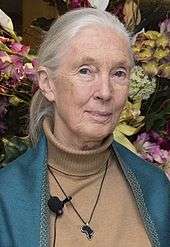
British primatologist Jane Goodall
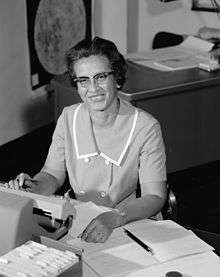
American NASA scientist Katherine Johnson
%2C_1967.jpg)
British astrophysicist Jocelyn Bell Burnell
- 1960: British primatologist Jane Goodall began studying chimpanzees in Tanzania; her study of them continued for over 50 years. Her observations challenged previous ideas that only humans made tools and that chimpanzees had a basically vegetarian diet.[241][242]
- 1960: American medical physicist Rosalyn Yalow received the Nobel Prize in Physiology or Medicine "for the development of radioimmunoassays of peptide hormones" along with Roger Guillemin and Andrew V. Schally who received it "for their discoveries concerning the peptide hormone production of the brain".[243]
- Early 1960s: German-Canadian metallurgist Ursula Franklin studied levels of radioactive isotope strontium-90 that were appearing in the teeth of children as a side effect of nuclear weapons testing fallout. Her research influenced the Partial Nuclear Test Ban Treaty of 1963.[244]
- 1960s: American mathematician Katherine Johnson calculated flight paths at NASA for manned space flights.[245]
- 1961: Indian chemist Asima Chatterjee became the first female recipient of a Shanti Swarup Bhatnagar Prize. She was recognized in the Chemical Sciences category for her contributions to phytomedicine.[246]
- 1962: South African botanist Margaret Levyns became the first woman president of the Royal Society of South Africa.[247]
- 1962: French physicist Marguerite Perey became the first female Fellow elected to the Académie des Sciences.[248]
- 1963: Elsa G. Vilmundardóttir became the first female Icelandic geologist, completing her studies at Stockholm University.[249]
- 1963: Maria Goeppert Mayer became the first American woman to receive a Nobel Prize in Physics; she shared the prize with J. Hans D. Jensen "for their discoveries concerning nuclear shell structure" and Eugene Paul Wigner "for his contributions to the theory of the atomic nucleus and the elementary particles, particularly through the discovery and application of fundamental symmetry principles".[250][251][252]
- 1964: American mathematician Irene Stegun completed the work which led to the publication of Handbook of Mathematical Functions, a widely used and widely cited reference work in applied mathematics.
- 1964: British chemist Dorothy Crowfoot Hodgkin received the Nobel Prize in Chemistry "for her determinations by X-ray techniques of the structures of important biochemical substances".[253]
- 1964: Scottish virologist June Almeida made the first identification of a human coronavirus.[254]
- 1965: Sister Mary Kenneth Keller became the first American woman to receive a Ph.D. in computer science.[255] Her thesis was titled "Inductive Inference on Computer Generated Patterns".[256]
- 1966: Japanese immunologist Teruko Ishizaka, working with Kimishige Ishizaka, discovered the antibody class Immunoglobulin E (IgE).[257]
- 1967: British astrophysicist Jocelyn Bell Burnell co-discovered the first radio pulsars.[258]
- 1967: Sue Arnold became the first female British Geological Survey person to go to sea on a research vessel.[200]
- 1967: South African radiobiologist Tikvah Alper discovered that scrapie, an infectious brain disease affecting sheep, did not spread via DNA or RNA like a viral or bacterial disease. The discovery enabled scientists to better understand diseases caused by prions.[259][260]
- 1967: Yvonne Brill, a Canadian-American rocket and jet propulsion engineer, invented the hydrazine resistojet propulsion system.
- 1969: Beris Cox became the first female paleontologist in the British Geological Survey.[200]
- 1969: Ukrainian-born astronomer Svetlana Gerasimenko co-discovered the 67P/Churyumov–Gerasimenko comet.[261]
1970s
- 1970: Dorothy Hill became the first female president of the Australian Academy of Science.[235]
- 1970: Samira Islam became the first Saudi Arabian person to earn a PhD in pharmacology.[262]
- 1970: Astronomer Vera Rubin published the first evidence for dark matter.[263]
- 1971: Audrey Jackson became the first female field geologist in the British Geological Survey.[200]
- 1972: Indian-American immunologist Flossie Cohen co-authored the first study demonstrating a biochemical basis for primary immuno-deficiency diseases.[264]
- 1973: American physicist Anna Coble became the first African-American woman to receive a PhD in biophysics, completing her dissertation at University of Illinois.[265]
- 1974: Dominican marine biologist Idelisa Bonnelly founded the Dominican Republic Academy of Science.[266]
- 1975: Indian chemist Asima Chatterjee was elected the General President of the Indian Science Congress Association. She simultaneously became the first woman scientist ever elected a member of the congress.[267]
- 1975: Indian geneticist Archana Sharma received the Shanti Swarup Bhatnagar Prize, the first female recipient in the Biological Sciences category.[268][269]
- 1975: Female officers of the British Geological Survey no longer had to resign upon getting married.[200]
- 1975: Chien-Shiung Wu became the first female president of the American Physical Society.[270]
- 1976: Filipino-American microbiologist Roseli Ocampo-Friedmann traveled to the Antarctic with Imre Friedmann and discovered micro-organisms living within the porous rock of the Ross Desert. These organisms – cryptoendoliths – were observed surviving extremely low temperatures and humidity, assisting scientific research into the possibility of life on Mars.[271]
- 1976: Margaret Burbidge was named the first female president of the American Astronomical Society.[272][273]
- 1977: The Association for Women Geoscientists was founded.[274]
- 1977: Argentine-Canadian scientist Veronica Dahl became one of the first women to earn a PhD in artificial intelligence.[275]
- 1977: Canadian-American Elizabeth Stern published her research on the link between birth control pills – which contained high levels of estrogen at the time – and the increased risk of cervical cancer development in women. Her data helped pressure the pharmaceutical industry into providing safer contraceptive pills with lower hormone doses.[276]
- 1978: Anna Jane Harrison became the first female president of the American Chemical Society.[277]
- 1978: Mildred Cohn served as the first female president of the American Society for Biochemistry and Molecular Biology, then called the American Society of Biological Chemists.[278][279][280]
1980s

Chinese-American virologist Flossie Wong-Staal
- 1980: Japanese geochemist Katsuko Saruhashi became the first woman elected to the Science Council of Japan.[281]
- 1980: Nigerian geophysicist Deborah Ajakaiye became the first woman in any West African country to be appointed a full professor of physics.[282][283] Over the course of her scientific career, she became the first female Fellow elected to the Nigerian Academy of Science, and the first female dean of science in Nigeria.[284]
- 1982: Nephrologist Leah Lowenstein became the first woman dean of a co-educational medical school in the United States.[285]
- 1983: American cytogeneticist Barbara McClintock received the Nobel Prize in Physiology or Medicine for her discovery of genetic transposition; she was the first woman to receive that prize without sharing it, and the first American woman to receive any unshared Nobel Prize.[286][287][288][289][290]
- 1983: Brazilian agronomist Johanna Döbereiner became a founding Fellow of the World Academy of Sciences.[291]
- 1983: Indian immunologist Indira Nath became the first woman scientist to receive the Shanti Swaroop Bhatnagar Award in the Medical Sciences category.[292][269]
- 1983: Geologist Sudipta Sengupta and marine biologist Aditi Pant became the first Indian women to visit the Antarctic.[293]
- 1985: After identifying HIV as the cause of AIDS, Chinese-American virologist Flossie Wong-Staal became the first scientist to clone and genetically map the HIV virus, enabling the development of the first HIV blood screening tests.[294]
- 1986: Italian neurologist Rita Levi-Montalcini received the Nobel Prize in Physiology or Medicine, shared with Stanley Cohen, "for their discoveries of growth factors".[295]
- 1988: American biochemist and pharmacologist Gertrude B. Elion received the Nobel Prize in Physiology or Medicine along with James W. Black and George H. Hitchings "for their discoveries of important principles for drug treatment".[296]
- 1988: American scientist and inventor Patricia Bath (born 1942) became the first African-American to patent a medical device, namely the Laserphaco Probe for improving the use of lasers to remove cataracts.[297]
1990s

Lithuanian-Canadian primatologist Birutė Galdikas
.jpg)
Chilean astronomer María Teresa Ruiz
- 1991: Doris Malkin Curtis became the first woman president of the Geological Society of America.[298]
- 1991: Indian geologist Sudipta Sengupta became the first woman scientist to receive the Shanti Swaroop Bhatnagar Award in the Earth Sciences category.[299][269]
- 1992: Edith M. Flanigen became the first woman awarded the Perkin Medal (widely considered the highest honor in American industrial chemistry) for her outstanding achievements in applied chemistry.[300][301] The medal especially recognized her syntheses of aluminophosphate and silicoaluminophosphate molecular sieves as new classes of materials.[301]
- 1995: German biologist Christiane Nüsslein-Volhard received the Nobel Prize in Physiology or Medicine, shared with Edward B. Lewis and Eric F. Wieschaus, "for their discoveries concerning the genetic control of early embryonic development".[302]
- 1995: British geomorphologist Marjorie Sweeting published the first comprehensive Western account of China's karst, entitled Karst in China: its Geomorphology and Environment.[303][304]
- 1995: Israeli-Canadian mathematical biologist Leah Keshet became the first woman president of the international Society for Mathematical Biology.[305]
- 1995: Jane Plant became the first female Deputy Director of the British Geological Survey.[200]
- 1995: Inspectors from the United Nations Special Commission discovered that Iraqi microbiologist Rihab Taha, nicknamed "Dr. Germ", had been overseeing a secret 10-year biological warfare development program in Iraq.[306][307]
- 1996: American planetary scientist Margaret G. Kivelson led a team that discovered the first subsurface, saltwater ocean on an alien world, on the Jovian moon Europa.[308][309]
- 1997: Lithuanian-Canadian primatologist Birutė Galdikas received the Tyler Prize for Environmental Achievement for her research and rehabilitation work with orangutans. Her work with orangutans, eventually spanning over 30 years, was later recognized in 2014 as one of the longest continuous scientific studies of wild animals in history.[310]
- 1997: Chilean astronomer María Teresa Ruiz discovered Kelu 1, one of the first observed brown dwarfs. In recognition of her discovery, she became the first woman to receive the Chilean National Prize for Exact Sciences.[311][312]
- 1998: Nurse Fannie Gaston-Johansson became the first African-American woman tenured full professor at Johns Hopkins University.[313]
- Late 1990s: Ethiopian-American chemist Sossina M. Haile developed the first solid acid fuel cell.[314][315]
21st century

Moroccan astronomer Merieme Chadid
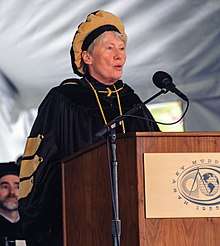
Canadian-American computer scientist Maria Klawe

Egyptian geomorphologist Eman Ghoneim

Kenyan ichthyologist Dorothy Wanja Nyingi
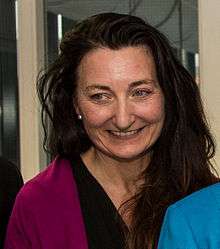
Norwegian neuroscientist May-Britt Moser

Canadian physicist Donna Strickland
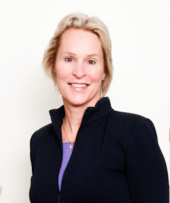
American chemical engineer Frances Arnold
2000s
- 2000: Venezuelan astrophysicist Kathy Vivas presented her discovery of approximately 100 "new and very distant" RR Lyrae stars, providing insight into the structure and history of the Milky Way galaxy.[316]
- 2003: American geophysicist Claudia Alexander oversaw the final stages of Project Galileo, a space exploration mission that ended at the planet Jupiter.[317]
- 2004: American biologist Linda B. Buck received the Nobel Prize in Physiology or Medicine along with Richard Axel "for their discoveries of odorant receptors and the organization of the olfactory system".[318]
- 2006: Chilean biochemist Cecilia Hidalgo Tapia became the first woman to receive the Chilean National Prize for Natural Sciences.[319]
- 2006: Chinese-American biochemist Yizhi Jane Tao led a team of researchers to become the first to map the atomic structure of Influenza A, contributing to antiviral research.[320][321]
- 2006: Parasitologist Susan Lim became the first Malaysian scientist elected to the International Commission on Zoological Nomenclature.[322]
- 2006: Merieme Chadid became the first Moroccan person and the first female astronomer to travel to Antarctica, leading an international team of scientists in the installation of a major observatory in the South Pole.[323]
- 2006: American computer scientist Frances E. Allen won the Turing Award for "pioneering contributions to the theory and practice of optimizing compiler techniques that laid the foundation for modern optimizing compilers and automatic parallel execution". She was the first woman to win the award.[324]
- 2006: Canadian-American computer scientist Maria Klawe became the president of Harvey Mudd College.[325]
- 2007: Using satellite imagery, Egyptian geomorphologist Eman Ghoneim discovered traces of an 11,000-year-old mega lake in the Sahara Desert. The discovery shed light on the origins of the largest modern groundwater reservoir in the world.[326]
- 2007: Physicist Ibtesam Badhrees was the first Saudi Arabian woman to become a member of the European Organization for Nuclear Research (CERN).[327]
- 2008: French virologist Françoise Barré-Sinoussi received the Nobel Prize in Physiology or Medicine, shared with Harald zur Hausen and Luc Montagnier, "for their discovery of HIV, human immunodeficiency virus".[328]
- 2008: American-born Australian Penny Sackett became Australia's first female Chief Scientist.[329]
- 2008: American computer scientist Barbara Liskov won the Turing Award for "contributions to practical and theoretical foundations of programming language and system design, especially related to data abstraction, fault tolerance, and distributed computing".[330]
- 2009: American molecular biologist Carol W. Greider received the Nobel Prize in Physiology or Medicine along with Elizabeth H. Blackburn and Jack W. Szostak "for the discovery of how chromosomes are protected by telomeres and the enzyme telomerase".[331]
- 2009: Israeli crystallographer Ada E. Yonath, along with Venkatraman Ramakrishnan and Thomas A. Steitz, received the Nobel Prize in Chemistry "for studies of the structure and function of the ribosome".[332]
- 2009: Chinese geneticist Zeng Fanyi and her research team published their experiment results proving that induced pluripotent stem cells can be used to generate whole mammalian bodies – in this case, live mice.[333]
2010s
- 2010: Marcia McNutt became the first female director of the United States Geological Survey.[334]
- 2011: Kazakhstani neuroscience student and computer hacker Alexandra Elbakyan launched Sci-Hub, a website that provides users with pirated copies of scholarly scientific papers. Within five years, Sci-Hub grew to contain 60 million papers and recorded over 42 million annual downloads by users. Elbakyan was finally sued by major academic publishing company Elsevier, and Sci-Hub was subsequently taken down, but it reappeared under different domain names.[335]
- 2011: Taiwanese-American astrophysicist Chung-Pei Ma led a team of scientists in discovering two of the largest black holes ever observed.[336]
- 2012: Clara Lazen, then a fifth grader, discovered the molecule tetranitratoxycarbon.[337]
- 2013: Canadian genetic specialist Turi King identified the 500-year-old skeletal remains of King Richard III.[338]
- 2013: Kenyan ichthyologist Dorothy Wanja Nyingi published the first guide to freshwater fish species of Kenya.[339]
- 2014: Norwegian psychologist and neuroscientist May-Britt Moser received the Nobel Prize in Physiology or Medicine, shared with Edvard Moser and John O'Keefe, "for their discoveries of cells that constitute a positioning system in the brain".[340]
- 2014: American paleoclimatologist and marine geologist Maureen Raymo became the first woman to be awarded the Wollaston Medal, the highest award of the Geological Society of London.[341][342]
- 2014: American theoretical physicist Shirley Ann Jackson was awarded the National Medal of Science. Jackson had been the first African-American woman to receive a PhD from the Massachusetts Institute of Technology (MIT) during the early 1970s, and the first woman to chair the U.S. Nuclear Regulatory Commission.[343][344]
- 2014: Iranian mathematician Maryam Mirzakhani became the first woman to receive the Fields Medal, for her work in "the dynamics and geometry of Riemann surfaces and their moduli spaces".[345]
- 2015: Chinese medical scientist Tu Youyou received the Nobel Prize in Physiology or Medicine, shared with William C. Campbell and Satoshi Ōmura; she received it "for her discoveries concerning a novel therapy against Malaria".[346]
- 2015: Asha de Vos became the first Sri Lankan person to receive a PhD in marine mammal research, completing her thesis on "Factors influencing blue whale aggregations off southern Sri Lanka" at the University of Western Australia.[347][348]
- 2016: Marcia McNutt became the first woman president of the American National Academy of Sciences.[349]
- 2018: British astrophysicists Hiranya Peiris and Joanna Dunkley and Italian cosmologist Licia Verde were among 27 scientists awarded the Breakthrough Prize in Fundamental Physics for their contributions to "detailed maps of the early universe that greatly improved our knowledge of the evolution of the cosmos and the fluctuations that seeded the formation of galaxies".[350]
- 2018: British astrophysicist Jocelyn Bell Burnell received the special Breakthrough Prize in Fundamental Physics for her scientific achievements and "inspiring leadership", worth $3 million. She donated the entirety of the prize money towards the creation of scholarships to assist women, underrepresented minorities and refugees who are pursuing the study of physics.[351]
- 2018: Canadian physicist Donna Strickland received the Nobel Prize in Physics "for groundbreaking inventions in the field of laser physics"; she shared it with Arthur Ashkin and Gérard Mourou.[352][353]
- 2018: Frances Arnold received the Nobel Prize in Chemistry "for the directed evolution of enzymes"; she shared it with George Smith and Gregory Winter, who received it "for the phage display of peptides and antibodies".[354] This made Frances the first American woman to receive the Nobel Prize in Chemistry.[355]
- 2018: For the first time in history, women received the Nobel Prize in Chemistry and the Nobel Prize in Physics in the same year.[356]
- 2019: Mathematician Karen Uhlenbeck became the first woman to win the Abel Prize for "her pioneering achievements in geometric partial differential equations, gauge theory, and integrable systems, and for the fundamental impact of her work on analysis, geometry and mathematical physics".[357]
- 2019: Imaging scientist Katie Bouman developed an algorithm that made the first visualization of a black hole possible using the Event Horizon Telescope. She was part of the team of over 200 people who implemented the project.[358][359][360][361]
2020s
- 2020: The Nigerian Academy of Science elected epidemiologist/parasitologist Ekanem Braide as its first female president.[362]
See also
- List of female scientists before the 20th century
- Lists of women in science
- Timeline of women in geology
- Timeline of women in library science
- Timeline of women in computing
- Timeline of women in mathematics
- Timeline of women in mathematics in the United States
- Timeline of women in science in the United States
- Women in physics
References
- Hope Jahren (2017). The Best American Science and Nature Writing 2017. Houghton Mifflin Harcourt. p. 312. ISBN 9781328715517.
- Aganice (XX bc)
- Kass-Simon, Gabriele; Farnes, Patricia; Nash, Deborah (1993). Women of Science: Righting the Record. Indiana University Press. p. 301. ISBN 978-0253208132.
tapputi.
- Ogilvie, Marilyn Bailey (1986). Women in Science. The MIT Press. ISBN 978-0-262-15031-6.
- Schmitz, Leonhard (1867), "Aganice", in Smith, William (ed.), Dictionary of Greek and Roman Biography and Mythology, 1, Boston, p. 59
- Rayner-Canham, Marelene F.; Rayner-Canham, Marelene; Rayner-Canham, Geoffrey (2001). Women in Chemistry: Their Changing Roles from Alchemical Times to the Mid-twentieth Century. Chemical Heritage Foundation. ISBN 9780941901277.
- Taylor, F. Sherwood. "A Survey of Greek Alchemy". The Journal of Hellenic Studies 50 (1930): 109–139.
- Knorr, Wilbur Richard (1989). "Pappus' texts on cube duplication". Textual Studies in Ancient and Medieval Geometry. Boston: Birkhäuser. pp. 63–76. doi:10.1007/978-1-4612-3690-0_5.
- "Hypatia". Encyclopedia Britannica. Retrieved 2018-08-29.
- Stanton J. Linden. The alchemy reader: from Hermes Trismegistus to Isaac Newton Cambridge University Press. 2003. p.44
- Maxwell-Stuart, P. G. (2012-03-01). The Chemical Choir: A History of Alchemy. A&C Black. p. 13. ISBN 9781441132970.
- "7060 Al-'Ijliya (1990 SF11)". Minor Planet Center. Retrieved 21 November 2016.
- Pushkareva, Natalia; Levin, Eve (2016). Women in Russian History: From the Tenth to the Twentieth Century. Taylor & Francis. pp. 27–. ISBN 978-1-315-48043-5.
- Drew, Jennifer (October 2010). "Early female scientists". Women's History Month. Retrieved 8 September 2018.
- Ferraris, Z. A.; Ferraris, V. A. (December 1997). "The women of Salerno: contribution to the origins of surgery from medieval Italy". The Annals of Thoracic Surgery. 64 (6): 1855–1857. doi:10.1016/s0003-4975(97)01079-5. ISSN 0003-4975. PMID 9436596.
- Walsh, James (1911). Old Time Makers of Medicine. New York: Fordham University Press. pp. 194–201.
- "Herrad of Landsberg". New Advent. Retrieved 7 September 2018.
- "Zulema, l'Astròloga (Mare d'Alí de la Palomera)" (in Catalan). Generalitat de Catalunya: Fitxa biografies. Retrieved 7 September 2018.
- Ogilvie, Marilyn; Harvey, Joy (2003). The Biographical Dictionary of Women in Science: Pioneering Lives From Ancient Times to the Mid-20th Century. Taylor & Francis. pp. 2830 ff. ISBN 978-1-135-96342-2.
- Robin, Diana Maury; Larsen, Anne R.; Levin, Carole (2007). Encyclopedia of Women in the Renaissance: Italy, France, and England. ABC-CLIO. p. 5. ISBN 9781851097722.
- Stanley, Autumn (1995). Mothers and Daughters of Invention: Notes for a Revised History of Technology. Rutgers University Press. p. 101. ISBN 9780813521978.
- Beard, Mary (1987). Woman as a Force in History: A Study in Traditions and Realities. Persea Books. p. 249. ISBN 9789352290031.
- "Sophia Brahe". National Schools' Observatory. Retrieved 7 September 2018.
- "Remarkable women in the history of Malta". Times of Malta. Allied Newspapers. Retrieved 2018-08-28.
- "'Sex In the City' tour: The knights and their ladies of the night". The Malta Independent. Retrieved 2018-08-28.
- Goodell, William (5 June 1876). A sketch of the life and writings of Louyse Bourgeois, midwife to Marie de' Medicine, the queen of Henry IV. of France. The annual address of the retiring president before the Philadelphia County Medical Society. Philadelphia, Pennsylvania: Collins, printer. pp. 1–52. Retrieved 18 December 2016.
- "Oxford Bibliography Anna Maria van Schurman".
- McNeill, Leila. "The 17th-Century Lady Astronomer Who Took Measure of the Stars". Smithsonian. Retrieved 2018-08-27.
- Paulk, Julia C. (2009-05-05). Dominant Culture and the Education of Women. Cambridge Scholars Publishing. pp. 53–67. ISBN 9781443810630.
- Ogilvie, Marilyn; Harvey, Joy (2003-12-16). The Biographical Dictionary of Women in Science: Pioneering Lives From Ancient Times to the Mid-20th Century. Routledge. p. 1142. ISBN 9781135963439.
- Olsen, Kirstin (1994). Chronology of Women's History. Greenwood Publishing Group. p. 81. ISBN 9780313288036.
Jeanne Dumée 1680.
- Bakker, Jan Albert (2010). Megalithic Research in the Netherlands, 1547–1911: From "giant's Beds" and "pillars of Hercules" to Accurate Investigations. Sidestone Press. pp. 54–55. ISBN 9789088900341.
Titia Brongersma .
- Cook, Alan (March 2000). "Johann and Elizabeth Hevelius, astronomers of Danzig". Endeavour. 24 (1): 8–12. doi:10.1016/S0160-9327(99)01263-6. PMID 10824438.
- Ley, Willy (1969). Watchers of the Skies.
- GrrlScientist (2013-04-02). "Maria Sibylla Merian: artist whose passion for insects changed science". The Guardian. Retrieved 2018-08-28.
- Salmon, Michael A.; Marren, Peter; Harley, Basil (2000). The Aurelian Legacy: British Butterflies and Their Collectors. University of California Press. pp. 106–107. ISBN 9780520229631.
- "Lady Eleanor and her elusive butterfly". Pharmaceutical Journal. Retrieved 2018-08-28.
- "Maria Kirch". Encyclopedia Britannica. Retrieved 2018-08-28.
- "Biography – Jérémie, Lamontagne, Catherine". Dictionary of Canadian Biography. Volume III (1741–1770). Retrieved 2018-08-31.
- "Laura Bassi". Encyclopedia Britannica. Retrieved 2018-08-31.
- Yanes, Javier (7 March 2016). "Women Pioneers of Science". OpenMind. Retrieved 8 September 2018.
- Detlefsen, Karen (2017), "Émilie du Châtelet", in Zalta, Edward N. (ed.), The Stanford Encyclopedia of Philosophy (Winter 2017 ed.), Metaphysics Research Lab, Stanford University, retrieved 2018-09-01
- "Eva Ekeblad". Encyclopedia Britannica. Retrieved 2018-08-31.
- Clark, William; Golinski, Jan; Schaffer, Simon (1999). The Sciences in Enlightened Europe. University of Chicago Press. pp. 313–349. ISBN 9780226109404.
- Oakes, Elizabeth H. Encyclopedia of World Scientists. Infobase Publishing, 2007, p. 147
- Legro, Michelle (2012-03-19). "'The Lady Anatomist': 18th-Century Wax Sculptures by Anna Manzolini". The Atlantic. Retrieved 2018-08-31.
- Ogilvie, Marilyn Bailey; Harvey, Joy Dorothy (2000). The Biographical Dictionary of Women in Science: L–Z. Taylor & Francis. pp. 772–773. ISBN 9780415920407.
- Edwards, Thomas S.; de Wolfe, Elizabeth A. (2001). Such News of the Land: U.S. Women Nature Writers. UPNE. p. 16. ISBN 9781584650980.
- Sparling, Andrew (2005). Putrefaction in the Laboratory: How an eighteenth-century experimentalist refashioned herself as an Homme de Lettres. Vom Individuum zur Person: neue Konzepte im Spannungsfeld von Autobiographietheorie und Selbstzeugnisforschung. Wallstein Verlag. pp. 173–188. ISBN 9783892448990.
- "Picardet, Claudine". Encyclopedia.com. Retrieved 2018-09-01.
- Lee, Lily Xiao Hong; Lau, Clara; Stefanowska, A. D. (2015-07-17). Biographical Dictionary of Chinese Women. v. 1: The Qing Period, 1644–1911. Routledge. ISBN 9781317475880.
- Mehta, Devang. "The prolific life of Wang Zhenyi, autodidact, astronomer, and poet". Massive. Retrieved 2018-08-31.
- Whaley, Leigh Ann (2003). Women's History as Scientists: A Guide to the Debates. ABC-CLIO. pp. 136–137. ISBN 9781576072301.
- Ida Emilie Steinmark (2017-10-10). "Elizabeth Fulhame: the scientist the world forgot". Education in Chemistry. Royal Society of Chemistry. Archived from the original on 2018-08-31. Retrieved 2018-08-31.
- Haines, Catharine M. C.; Stevens, Helen M. (2001). International Women in Science: A Biographical Dictionary to 1950. ABC-CLIO. p. 46. ISBN 9781576070901.
Margaret Bryan 1815.
- "Anna Sundström". Gustavianum. Uppsala University, Sweden. Retrieved 2018-09-08.
- "Restoring the Reputation of Lady Hester Lucy Stanhope". Center for Online Judaic Studies. 2008-07-27. Retrieved 2018-09-03.
- Swift, Amanda (July 2001). "Sophie Germain". Agnes Scott College. Retrieved 8 September 2018.
- "Fiorini Mazzanti Elisabetta — Scienza a due voci". scienzaa2voci.unibo.it. Retrieved 2019-12-09.
- Creese, Mary R. S.; Creese, Thomas M. (2004). Ladies in the Laboratory II: West European Women in Science, 1800–1900: a Survey of Their Contributions to Research. Scarecrow Press. pp. 101–104. ISBN 9780810849792.
- "Jeanne Villepreux-Power". Encyclopedia Britannica. Retrieved 2018-09-23.
- "Amelia Warren Griffiths (1768-1858)". Royal Albert Memorial Museum & Art Gallery, Exeter. Retrieved 2018-09-08.
- "Royal Astronomical Society". Encyclopedia Britannica. Retrieved 2018-08-23.
- "Mary Somerville". Encyclopedia Britannica. Retrieved 2018-08-23.
- "Etheldred Benett (1775–1845)". The Geological Society of London. Retrieved 2018-09-08.
- "Benett, Etheldred (1776-1845)". Encyclopedia.com. Retrieved 2018-09-08.
- Burek, Cynthia V.; Higgs, Bettie; London, Geological Society of (2007). The Role of Women in the History of Geology. Geological Society of London. p. 40. ISBN 9781862392274.
- Menabrea, Luigi Federico; Lovelace, Ada (1843). "Sketch of the Analytical Engine invented by Charles Babbage... with notes by the translator. Translated by Ada Lovelace". In Richard Taylor (ed.). Scientific Memoirs. 3. London: Richard and John E. Taylor. pp. 666–731.
- Simonite, Tom (24 March 2009). "Short Sharp Science: Celebrating Ada Lovelace: the 'world's first programmer'". New Scientist. Retrieved 14 April 2012.
- Parker, Matt (2014). Things to Make and Do in the Fourth Dimension. Farrar, Straus & Giroux. p. 261. ISBN 978-0374275655.
- Kim, Eugene; Toole, Betty Alexandra (1999). "Ada and the First Computer". Scientific American. 280 (5): 76–81. Bibcode:1999SciAm.280e..76E. doi:10.1038/scientificamerican0599-76.
- Castle, Terry. "The First Female Photographer". frieze.com. Retrieved 2018-09-02.
- Packard, A. S., ed. (1876). Aquaria: Their Past, Present, and Future. The American Naturalist. 10. Essex Institute. p. 615.
- Mary Wyer (2001). Women, Science, and Technology: A Reader in Feminist Science Studies. Psychology Press. p. 3. ISBN 978-0-415-92606-5.
- Kohn, David (2014-07-14). The Darwinian Heritage. Princeton University Press. p. 537. ISBN 9781400854714.
- "To M. A. T. Whitby 12 August [1849]". Darwin Correspondence Project. Retrieved 2018-09-21.
- Rossiter, Margaret W. (1984). Women Scientists in America: Struggles and Strategies to 1940. JHU Press. p. 76. ISBN 9780801825095.
- Birks, J. L. (2005). "The Penllergare Observatory". The Antiquarian Astronomer. 2: 3–8. Bibcode:2005AntAs...2....3B.
- McNeill, Leila. "This Lady Scientist Defined the Greenhouse Effect But Didn't Get the Credit, Because Sexism". Smithsonian. Retrieved 2018-09-21.
- "Dietrich, Koncordie Amalie". Encyclopedia of Australian Science. The University of Melbourne eScholarship Research Centre. Retrieved 2018-09-21.
- Joseph, May; Fink, Jennifer (1999). Performing Hybridity. University of Minnesota Press. p. 46. ISBN 9780816630103.
- Hardie-Budden, Melissa. "Elizabeth Catherine Thomas Carne: A 19th century Hypatia". Cite journal requires
|journal=(help) - Mielewczik, Michael; Jowett, Kelly; Moll, Janine. "Beehives, Booze and Suffragettes: The "Sad Case" of Ellen S. Tupper (1822–1888), the "Bee Woman" and "Iowa Queen Bee"". Entomologie Heute. 31: 113–227. Retrieved 22 March 2020.
- Ford, Lynne E. (2010-05-12). "Ellen Swallow Richards". Encyclopedia of Women and American Politics. ISBN 9781438110325.
- "Early Women Chemists in Russia: Anna Volkova, Iuliia Lermontova, and Nadezhda Ziber-Shumova" (PDF). Bulletin for the History of Chemistry. 21. 1998.
- Coltofean, Laura. Szabó, Cs.; Rusu-Bolindeț, V.; Rustoiu, G. T.; Gligor, M. (eds.). "Adalbert Cserni and His Contemporaries. The Pioneers of Alba Iulia and Beyond". In: Cs. Szabó, V. Rusu-Bolindeț, G. T. Rustoiu, M. Gligor (Eds.): Adalbert Cserni and His Contemporaries. The Pioneers of Alba Iulia and Beyond. Mega Publishing House, Cluj-Napoca, 2017, P. 327-354. Cluj-Napoca: Mega Publishing House: 327–354.
2017. Zsófia Torma: A pioneer of prehistoric archaeology in nineteenth-century Transylvania
- Creese, Mary R. S. (2000-01-01). Ladies in the Laboratory? American and British Women in Science, 1800–1900: A Survey of Their Contributions to Research. Scarecrow Press. pp. 4–5. ISBN 9780585276847.
- Wood, Mick (1999). "Meteorologist's profile – Eleanor Anne Ormerod". Weather. 54 (11): 365–369. Bibcode:1999Wthr...54..365W. doi:10.1002/j.1477-8696.1999.tb05536.x. ISSN 0043-1656.
- Heppner, John B.; Heppner, John B.; Tzanakakis, Minos E.; Tzanakakis, Minos E.; Tzanakakis, Minos E.; Lawrence, Pauline O.; Capinera, John L.; Nagoshi, Rod; Gerlach, Günter (2008), "Ormerod, Eleanor Anne", Encyclopedia of Entomology, Springer Netherlands, pp. 2693–2694, doi:10.1007/978-1-4020-6359-6_1886, ISBN 9781402062421
- "Who was Agnes Pockels?". TU Braunschweig. Retrieved 2018-09-21.
- Olsen, Kirstin (1994). Chronology of Women's History. Greenwood Publishing Group. p. 153. ISBN 9780313288036.
Erminnie A. Smith.
- Creese, Mary R. S. (2000-01-01). Ladies in the Laboratory? American and British Women in Science, 1800–1900: A Survey of Their Contributions to Research. Scarecrow Press. p. 109. ISBN 9780585276847.
- "Farquharson [née Ridley], Marian Sarah (1846–1912), naturalist and campaigner for women's interests". Oxford Dictionary of National Biography (online ed.). Oxford University Press. 2004. doi:10.1093/ref:odnb/55777. (Subscription or UK public library membership required.)
- Olsen, Kirstin (1994). Chronology of Women's History. Greenwood Publishing Group. p. 157. ISBN 9780313288036.
Emily Gregory American Society of Naturalists.
- University of Nebraska–Lincoln. "Rachel Lloyd, PhD – Pioneering Woman in Chemistry" (PDF). American Chemical Society. Retrieved September 9, 2018.
- S. Kovalevskaya, "Sur le problème de la rotation d'un corps solide autour d'un point fixe". Acta Mathematica 12 (1889) 177–232.
- E. T. Whittaker, A Treatise on the Analytical Dynamics of Particles and Rigid Bodies, Cambridge University Press (1952).
- Warren, Wini (1999). Black Women Scientists in the United States. Indiana University Press. p. 285. ISBN 978-0253336033.
Josephine Silone Yates.
- Brown, Jeannette (2012-01-05). African American Women Chemists. Oxford University Press, USA. p. 15. ISBN 9780199742882.
- Edwin Butt Eckel (1982). The Geological Society of America: Life History of a Learned Society. Journal of the American Water Resources Association. 19. p. 36. Bibcode:1983JAWRA..19..512M. doi:10.1111/j.1752-1688.1983.tb04617.x. ISBN 978-0-8137-1155-3.
- "Significant contributors in the history of Newnham College". Newnham College. Retrieved 2018-09-21.
- Daw, Gillian (2014-03-06). "'On the Wings of Imagination': Agnes Giberne and women as the Storytellers of Victorian Astronomy". The Victorian. 2 (1). ISSN 2309-091X.
- A. S. D. M. (April 1889). "Obituary - Miss E. Brown". articles.adsabs.harvard.edu. The Observatory. pp. 171–172. Retrieved 2018-09-23.
- Series, Caroline. "And what became of the women?", Mathematical Spectrum, Vol. 30 (1997/8), 49h52
- Trimble, Virginia; Williams, Thomas R.; Bracher, Katherine; Jarrell, Richard; Marché, Jordan D.; Ragep, F. Jamil (2007-09-18). Biographical Encyclopedia of Astronomers. Springer Science & Business Media. p. 646. ISBN 9780387304007.
- "Christine Ladd-Franklin". psychology.jrank.org. Retrieved 2018-09-08.
- "Florence Bascom papers, 1883–1938". Dla.library.upenn.edu. Retrieved 2018-07-28.
- Clary, R. M. "Great expectations: Florence Bascom (1842–1945) and the education of early US women geologists". Geological society of London Publications. Retrieved 2017-10-10.
- Schneidermann, Jill (July 1997). "A Life of Firsts: Florence Bascom" (PDF). GSA Today. Geological Society of America.
- "Elizabeth Gertrude Knight Britton Records". sciweb.nybg.org. Retrieved 2018-09-22.
- Hoffleit, Dorrit (December 1983). "Maria Mitchell's famous students" (PDF). CSWP Gazette. Committee on the Status of Women in Physics of the American Physical Society. 3 (4): 1–4.
- Haines, Catharine M. C.; Stevens, Helen M. (2001). International Women in Science: A Biographical Dictionary to 1950. ABC-CLIO. pp. 31–32. ISBN 9781576070901.
Marion Bidder the royal society.
- "The Stone Lady, Florence Bascom (U.S. National Park Service)". Nps.gov. 1945-06-18. Retrieved 2018-07-28.
- Schneidermann, Jill (July 1997). "A Life of Firsts: Florence Bascom" (PDF). GSA Today. Geological Society of America.
- Creese, Mary R. S. (2004). "Smith, Annie Lorrain (1854–1937), mycologist and lichenologist". Oxford Dictionary of National Biography (online ed.). Oxford University Press. doi:10.1093/ref:odnb/46420. (Subscription or UK public library membership required.)
- "The British Mycological Society". www.britmycolsoc.org.uk. Retrieved 2018-09-09.
- Creese, Mary R. S. (2000-01-01). Ladies in the Laboratory? American and British Women in Science, 1800–1900: A Survey of Their Contributions to Research. Scarecrow Press. p. 104. ISBN 9780585276847.
- Ogilvie, Marilyn Bailey; Harvey, Joy Dorothy (2000). The Biographical Dictionary of Women in Science. Taylor & Francis. p. 1241. ISBN 9780415920407.
- Staley, Richard (2008). Einstein's Generation: The Origins of the Relativity Revolution. University of Chicago Press. p. 168. ISBN 9780226770574.
- Aaserud, Finn, ed. (2013-10-22). Niels Bohr: Collected Works. 12. Elsevier. p. 122. ISBN 9780080466873.
- "Marianna Paulucci". Museum of Natural History, University of Florence. 2016-04-19. Archived from the original on 2016-04-19. Retrieved 2018-09-20.
- Ogilvie, Marilyn Bailey (1986). Women in Science: Antiquity Through the Nineteenth Century: a Biographical Dictionary with Annotated Bibliography. MIT Press. pp. 107–108. ISBN 9780262650380.
Marcia Keith physicist.
- Duck, Francis (December 2013). "Edith Stoney MA, the first woman medical physicist" (PDF). SCOPE. 22 (4): 49–54.
- Fraser, Susan. "Anna Murray Vail Papers". sciweb.nybg.org. Retrieved 2018-09-21.
- irishawg (2016-08-20). "Women in Geoscience Series". Irish Association for Women in Geosciences. Retrieved 2018-07-28.
- "Marie Zdeňka Baborová-Čiháková – Ženy ve vědě do roku 1945". albina.ff.cuni.cz (in Czech). Retrieved 2018-10-08.
- "Annie Jump Cannon | American astronomer". Encyclopædia Britannica. Retrieved 2016-09-10.
- "Nobel Laureates Facts - Women". Nobel Foundation. Retrieved 2017-10-07.
- "Nobel Prize in Physics 1903". Nobel Foundation. Retrieved 2008-10-16.
- "The Nobel Prize in Physics 1903". Nobel Foundation. Retrieved 2008-10-09.
- McNeill, Leila. "The Woman Who Transformed How We Teach Geography". Smithsonian. Retrieved 2018-09-02.
- Mason, Joan (1991). "A forty years' war". Chemistry in Britain. pp. 233–238.
- "Proceedings of the Linnean Society of London (One Hundred and Seventeenth Session, 1904–1905)". Proceedings of the Linnean Society of London. 117: 1–58. 1905. doi:10.1111/j.1095-8312.1905.tb01410.x.
- "Nettie Stevens: A Discoverer of Sex Chromosomes". Scitable. Retrieved 8 September 2018.
- "Inventory to the papers of Alice Eastwood at the California Academy of Sciences Library - MSS.142 Eastwood (Alice) Papers". researcharchive.calacademy.org. Retrieved 2018-08-23.
- Olsen, Julie A.; Shea, Kevin M. (2011). "Critical Perspective: Named Reactions Discovered and Developed by Women". Chemistry: Faculty Publications. 11.
- "Hertha Marks Ayrton". www.agnesscott.edu. Retrieved 2018-09-03.
- Wale, Matthew (2018-03-02). "Emma Hutchinson (1820–1906)". Constructing Scientific Communities. Retrieved 2018-09-12.
- "Alice Wilson". science.ca. Retrieved 2018-08-08.
- "66. Ottawa Geology (1946)". Science.gc.ca. 2017-03-03. Retrieved 2018-08-08.
- James-Abra, Erin. "Alice Wilson". The Canadian Encyclopedia. Retrieved 2018-08-23.
- "Lemelson-MIT Program". web.mit.edu. Retrieved 2018-08-20.
- "The Nobel Prize in Chemistry 1911". Nobel Foundation. Retrieved 2008-10-06.
- "Beaverton student Valerie Ding to compete in national science fair competition". OregonLive.com. September 2011. Retrieved 2018-08-20.
- Semb-Johansson, Arne (2014-09-28), "Kristine Bonnevie", Norsk biografisk leksikon (in Norwegian), retrieved 2018-10-08
- Gillett, Margaret. "Carrie Derick". The Canadian Encyclopedia. Retrieved 2018-08-23.
- Wójcik, Zbigniew. "Regina Danysz-Fleszarowa 1888–1969" (PDF). Kwartalnik Historii Nauki I Techniki. 15 (4): 791–796.
- "Izabela Textorisová – Portrait and Work". www.mindop.sk. Retrieved 2018-09-03.
- "Maud Leonora Menten: Canadian biochemist and organic chemist". Encyclopedia Britannica. Retrieved 2018-08-22.
- Fara, Patricia (2017-12-29). A Lab of One's Own: Science and Suffrage in the First World War. Oxford University Press. ISBN 9780192514172.
- Jacobs, Adriaana. "The life and times of Ethel Mary Doidge, a pioneer of South African mycology" (PDF). IMA Fungus.
- Raymond, Katrine. "Isabella Preston". The Canadian Encyclopedia. Retrieved 2018-08-22.
- Haines, Catharine M. C.; Stevens, Helen M. (2001). International Women in Science: A Biographical Dictionary to 1950. ABC-CLIO. p. 164. ISBN 9781576070901.
- Schmitt, Waldo L. (1973). "Mary J. Rathbun 1860–1943" (PDF). Crustaceana. 24 (3): 283–296. doi:10.1163/156854073X00641.
- Stamhuis, Ida H. (1995). "A Female Contribution to Early Genetics: Tine Tammes and Mendel's Laws for Continuous Characters". Journal of the History of Biology. 28 (3): 495–531. doi:10.1007/BF01059390. JSTOR 4331365. PMID 11609021.
- Ne'eman, Yuval (1999). The Impact of Emmy Noether's Theorems on XXIst Century Physics in Teicher. Teicher. pp. 83–101.
- "New Zealand Science Monthly". 2013-05-05. Archived from the original on 2013-05-05. Retrieved 2018-08-23.
- Creese, Mary R. S.; Creese, Thomas M. (2010). Ladies in the Laboratory III: South African, Australian, New Zealand, and Canadian Women in Science: Nineteenth and Early Twentieth Centuries. Scarecrow Press. pp. 17–18. ISBN 9780810872899.
- Alvarez, Adriana; Carbonetti, Adrián (2008). Saberes y prácticas médicas en la Argentina: un recorrido por historias de vida (in Spanish) (1 ed.). Mar del Plata: H.I.S.A., Universidade Nacional de Mar del Plata. pp. 155, 166. ISBN 978-9-871-37119-8.
- "Mexia, Ynes Enriquetta Julietta (1870–1938)". JSTOR Global Plants.
- "Engineering Education Blog: First Woman Elected to National Academy of Science". K-grayengineeringeducation.com. Retrieved 2014-02-16.
- "Cecilia Payne-Gaposchkin". Encyclopedia Britannica. Retrieved 2018-10-08.
- "Kono Yasui". Ochanomizu University Digital Archives. Retrieved 2018-08-23.
- "Medicine: Bacteriologists". Time. January 9, 1928. Retrieved 2009-11-26.
- Zimmer, Mitchell (2005). "The Science Flashpoint – Helen Battle – A Part of Our History". Archived from the original on 2016-04-27. Retrieved 2018-08-22.
- "Who was... Kathleen Carpenter?". thebiologist.rsb.org.uk. Retrieved 2018-08-23.
- Sicherman, Barbara; Green, Carol Hurd (1980). Notable American Women: The Modern Period: a Biographical Dictionary. Harvard University Press. pp. 229–230. ISBN 9780674627338.
Margaret Clay Ferguson bio.
- "CAS Students to Lead Seminar On University's African Alumni, Pt. IV: Agnes Yewande Savage". CAS from the Edge. 2016-11-16. Retrieved 2018-04-01.
- Tetty, Charles (1985). "Medical Practitioners of African Descent in Colonial Ghana". The International Journal of African Historical Studies. 18 (1): 139–144. doi:10.2307/217977. JSTOR 217977. S2CID 7298703.
- Patton, Adell (1996). Physicians, Colonial Racism, and Diaspora in West Africa. University Press of Florida. ISBN 9780813014326.
Physicians, Colonialism, and Diaspora in West Africa.
- "Concepción Mendizábal Mendoza". Instituto de investigaciones Históricas Políticas Económicas y Sociales (in Spanish). 2018-08-08. Retrieved 2020-03-27.
- "Michiyo Tsujimura". Ochanomizu University Digital Archives. Retrieved 2018-08-23.
- Rentetzi, Maria (September 2004). "Gender, Politics, and Radioactivity Research in Interwar Vienna The Case of the Institute for Radium Research". Isis. 95 (3): 359–393. doi:10.1086/428960. JSTOR 10.1086/428960. PMID 15747771.
- Rosner, Robert W. (2003). Marietta Blau – Sterne der Zertrümmerung: Biographie einer Wegbereiterin der modernen Teilchenphysik. Vienna, Austria: Böhlau Verlag. p. 32. ISBN 978-3-205-77088-6.
- "History of Black Scientists: Ruth Ella Moore & James McCune Smith". National Institutes of Health Office of Equity, Diversity and Inclusion. Retrieved 2018-09-24.
- "The Nobel Prize in Chemistry 1935". Nobel Foundation. Retrieved 2008-10-16.
- "HIPS – Notables: Grace Sturtevant". www.historiciris.org. Retrieved 2018-09-08.
- Tiffany K. Wayne (2011). American Women of Science Since 1900. ABC-CLIO. p. 514. ISBN 978-1-59884-158-9.
- "Royal Society Te Apārangi - Kathleen Curtis". Royalsociety.org.nz. Retrieved 2018-08-23.
- Edmond A. Mathez, ed. (2000). Earth: Inside and Out. American Museum of Natural History. Archived from the original on 2008-04-30.
- Petersen, Myrna (2005). The Pathological Casebook of Dr. Frances McGill. Ideation Entertainment. p. 127.
- Webmaster. "Femmes d'Haiti: Suzanne Comhaire-Sylvain". www.haiticulture.ch (in French). Retrieved 2018-08-28.
- Roberts, Warren Everett (1994). The Tale of the Kind and the Unkind Girls: AA-TH 480 and Related Titles. Wayne State University Press. pp. x. ISBN 978-0814324905.
- "Comhaire-Sylvain (Suzanne) papers". oac.cdlib.org. Retrieved 2018-08-28.
- Dazinger, Walter (27 January 2014). "Preisträger des Haitinger-Preises 1905–1936" (PDF) (in German). Institut für Angewandte Synthesechemie, Vienna, Austria: Die Ignaz-Lieben-Gesellschaft Verein zur Förderung der Wissenschaftsgeschichte. p. 3. Archived from the original (PDF) on 5 March 2016. Retrieved 25 March 2016.
- Rentetzi, Maria (1 March 2009). "Marietta Blau (1894–1970)". JWA.org. Brookline, Massachusetts: Jewish Women's Archive. Archived from the original on 12 October 2016. Retrieved 23 August 2018.
- Vidal, Yinka (2015-03-04). How to Prevent the Spread of Ebola: Effective Strategies to Reduce Hospital Acquired Infections. Lara Publications Inc. ISBN 9780964081888. Archived from the original on 2016-05-07.
- Anibaba, Musliu Olaiya (2003). A Lagosian of the 20th century: an autobiography. Tisons Limited. ISBN 9789783557116. Archived from the original on 2016-12-23.
- Ezeh, Godwin Chukwuemeka (2004). Nigerian heroes and heroines: and other issues in citizenship education. Mike Social Press. Archived from the original on 2016-12-22.
- "Celebrating African Women in Medicine". Tabitha Medical Center. Archived from the original on 2017-12-06. Retrieved 2018-04-01.
- Smith, Anthony (2004). "Obituary: Marjorie Courtenay-Latimer". The Guardian. Retrieved 2018-08-26.
- Meitner, L.; Frisch, O. R. (1939). "Disintegration of Uranium by Neutrons: A New Type of Nuclear Reaction". Nature. 143 (3615): 239. Bibcode:1939Natur.143..239M. doi:10.1038/143239a0.. Meitner is identified as being at the Physical Institute, Academy of Sciences, Stockholm. Frisch is identified as being at the Institute of Theoretical Physics, University of Copenhagen.
- Frisch, O. R. (1939). "Physical Evidence for the Division of Heavy Nuclei under Neutron Bombardment". Nature. 143 (3616): 276. Bibcode:1939Natur.143..276F. doi:10.1038/143276a0. [The experiment for this letter to the editor was conducted on 13 January 1939; see Richard Rhodes, The Making of the Atomic Bomb pp. 263, 268 (Simon and Schuster, 1986).]
- Science, Live (2013-09-11). "What is Francium?". Livescience.com. Retrieved 2018-08-20.
- Gamm, Gül Demir-Niki. "Muazzez Çığ stands among the world's best Sumerologists". www.hurriyet.com.tr (in Turkish). Retrieved 2019-09-02.
- Epps, Charles H.; Johnson, Davis G.; Vaughan, Audrey L. (1993). "Black medical pioneers: African-American 'firsts' in academic and organized medicine. Part three". Journal of the National Medical Association. 85 (10): 777–796. PMC 2568213. PMID 8254696.
- Williams, Marguerite (1942). A History of Erosion in the Anacostia Basin (Thesis). World Cat. Retrieved 8 March 2014.
- "Women's History Month – Marguerite Thomas Williams". University of the District of Columbia. Retrieved 2018-09-24.
- Blakemore, Erin. "Google Doodle Honors Little-Known Math Genius Who Helped America Reach the Stars". Smithsonian. Retrieved 2018-09-26.
- Bowie, R. "Freedom and Equality – Women in Geology". British Geological Survey, Natural Environment Research Council. Retrieved 2018-05-23.
- Smith, K. N. "Today's Google Doodle Honors Chemist Asima Chatterjee". Forbes. Retrieved 2018-10-07.
- Sheppard, Alyson (2013-10-13). "Meet the 'Refrigerator Ladies' Who Programmed the ENIAC". Mental Floss. Retrieved 2018-10-09.
- "The Nobel Prize in Physiology or Medicine 1947". Nobel Foundation. Retrieved 2007-07-28.
- "Gerty Cori - Facts". Nobelprize.org. 1957-10-26. Retrieved 2018-08-19.
- "Nobel Prize for Medicine 2015 winners". Erewise. Retrieved 2018-08-20.
- "Marie Maynard Daly". Science History Institute. 2016-06-01. Retrieved 2018-09-28.
- "Berta Karlik" (in German). Vienna, Austria: Universität Wien Projekt Lise. 2010. Archived from the original on 8 April 2017. Retrieved 10 January 2016.
- Bumsted, J. M. "Memorable Manitobans: Margaret Newton (1887–1971)". www.mhs.mb.ca. Retrieved 2018-08-23.
- "Валида Хасполад гызы Тутаюг (1914–1980)". www.adau.edu.az (in Azerbaijani). Archived from the original on May 28, 2015. Retrieved 2018-10-08.
- Pearce, Jeremy. "Tsai-Fan Yu, 95, Physician, Dies; Helped Alleviate Gout". Retrieved 2018-08-24.
- Arlene B. Hirschfelder; Paulette Fairbanks Molin (2012). The Extraordinary Book of Native American Lists. Scarecrow Press. pp. 278–. ISBN 978-0-8108-7709-2.
- "'Seaweed lady' Isabella Abbott dies". Monterey Herald. 2018-08-19. Retrieved 2018-08-23.
- Lederberg, E. M., 1950, "Lysogenicity in Escherichia coli strain K-12", Microbial Genetics Bulletin 1, pp. 5–9, January 1950, University of Wisconsin (Evelyn Maisel Witkin, Editor), Ohio State University, ISSN 0026-2579, call No. 33-M-4, OCLC 04079516, Accession Number: AEH8282UW" http://www.estherlederberg.com/Censorship/LambdaW.html
- "Esther Afua Ocloo: Ghana's inspiring businesswoman". www.aljazeera.com. Archived from the original on 2018-02-26. Retrieved 2018-04-01.
- "Dr. (Mrs.) Ester Afua Ocloo, Nkulenu Fame (RIP)". www.ghanaweb.com. Archived from the original on 2017-07-23. Retrieved 2018-04-01.
- "Esther Ocloo Passes Away". www.ghanaweb.com. Archived from the original on 2017-06-20. Retrieved 2018-04-01.
- "1952 | Timeline of Computer History | Computer History Museum". computerhistory.org. Retrieved 2018-08-20.
- "Due credit". Nature. 496 (7445): 270. 18 April 2013. doi:10.1038/496270a. PMID 23607133.
- "DNA: the King's story".
- "Secret of Photo 51". Nova. PBS.
- The gene: a historical perspective. Greenwood Publishing Group. 2007. p. 85. ISBN 9780313334498.
PHOTO 51 rosalind franklin.
- Krock, Lexi (22 April 2003). "Anatomy of Photo 51". Nova. PBS.
- Watson, James D.; Crick, Francis (1953). "A Structure for Deoxyribose Nucleic Acid" (PDF). Nature. 171 (4356): 737–738. Bibcode:1953Natur.171..737W. doi:10.1038/171737a0. PMID 13054692.
- "Mary MacArthur – Pioneer in Food Dehydration". ingeniumcanada.org. 2016-05-16. Retrieved 2018-08-22.
- "Fellows of the Agricultural Institute of Canada" (PDF). The Agricultural Institute of Canada. Retrieved 2018-08-22.
- Dubrovsky, Joseph G.; Ivanov, Victor B. (2003). "Celebrating 50 years of the cell cycle". Nature. 426 (6968): 759. Bibcode:2003Natur.426..759D. doi:10.1038/426759a. ISSN 0028-0836. PMID 14685201.
- Cameron, Ewen K. (2018). "Lucy Cranwell, New Zealand's First Female Curator". Auckland War Memorial Museum.
- Hulbe, Christina L. (2010). "Women in glaciology, a historical perspective" (PDF). Journal of Glaciology. 56 (200): 944–964. Bibcode:2010JGlac..56..944H. doi:10.3189/002214311796406202.
- Thomas, Campbell (2000-01-12). "Moira Dunbar". The Guardian. Retrieved 2018-08-23.
- "80th Anniversary: Northern Exposure". The Royal Canadian Geographical Society. Retrieved 2018-08-23.
- "Google Doodle celebrates Katsuko Saruhashi, pioneering Japanese scientist and champion of women". Newsweek. 2018-03-22. Retrieved 2018-08-23.
- Brears, Robert C. "The first woman and female scientists in Antarctica". oceanwide-expeditions.com. Retrieved 2018-10-08.
- Wu, C. S.; Ambler, E.; Hayward, R. W.; Hoppes, D. D.; Hudson, R. P. (1957). "Experimental Test of Parity Conservation in Beta Decay" (PDF). Physical Review. 105 (4): 1413–1415. Bibcode:1957PhRv..105.1413W. doi:10.1103/PhysRev.105.1413.
- Eberhard Zeidler (17 August 2011). Quantum Field Theory III: Gauge Theory: A Bridge between Mathematicians and Physicists. Springer Science & Business Media. pp. 196–. ISBN 978-3-642-22421-8.
- "Dorothy Hill Medal". Australian Academy of Science. Retrieved 2018-08-25.
- Bastock, M. (1956). "A gene mutation which changes a behaviour pattern". Evolution, 10: p. 421–439.
- Lee, Lily Xiao Hong (2016-07-08). Biographical Dictionary of Chinese Women. v. 2: Twentieth Century. Routledge. ISBN 9781315499239.
- "Ye Shuhua: China's Pioneering Woman Astronomer". All China Women's Federation. Retrieved 2018-08-25.
- "Our History". gaas-gh.org. Retrieved 2018-08-25.
- "National Commission On Culture". ghanaculture.gov.gh. Retrieved 2018-08-25.
- "Jane Goodall to give talk at Cambridge". University of Cambridge. 2007-12-04. Retrieved 2018-08-24.
- Gonzalez, Oscar (2018-04-22). "Earth Day 2018: How Jane Goodall's Study of Chimps Changed Anthropology". Inverse. Retrieved 2018-08-24.
- "The Nobel Prize in Physiology or Medicine 1977". Nobel Foundation. Retrieved 2007-07-28.
- Raymond, Katrine. "Ursula Franklin". The Canadian Encyclopedia. Retrieved 2018-08-23.
- "12 incredible women you've never heard of who changed science forever". Business Insider. Retrieved 8 September 2018.
- "Asima Chatterjee: All You Need to Know About One of India's First Woman Doctorates of Science!". The Better India. 2017-09-23. Retrieved 2018-10-07.
- "Margaret Levyns: The Making of a South African Botanist". Royal Society of South Africa. 2014-07-20. Retrieved 2018-08-26.
- Apotheker, Jan; Sarkadi, Livia Simon (2011-04-27). European Women in Chemistry. John Wiley & Sons. ISBN 9783527636464.
- Jóhannesson, Guðni A. (2008). "Elsa Guðbjörg Vilmundardóttir". www.mbl.is (in Icelandic). Retrieved 2018-10-08.
- "The Nobel Prize in Physics 1963". Nobel Foundation. Retrieved 2008-10-09.
- "The Nobel Prize in Physics 1963". Nobel Foundation. Retrieved 2013-09-06.
- Des Julie (2010). The Madame Curie Complex: The Hidden History of Women in Science. Feminist Press at CUNY. p. 163. ISBN 978-1-55861-655-4.
- "The Nobel Prize in Chemistry 1964". Nobel Foundation. Retrieved 2008-10-16.
- "The woman who discovered the first coronavirus". BBC News. 2020-04-15. Retrieved 2020-04-15.
- Steel, Martha Vickers (2001). "Women in Computing: Experiences and Contributions Within the Emerging Computing Industry" (PDF). Computing History Museum.
- "UW-Madison Computer Science Ph.D.s Awarded, May 1965 – August 1970". UW-Madison Computer Sciences Department. Retrieved 2010-11-08.
- Alt, Frederick W. (2005). Advances in Immunology. Gulf Professional Publishing. p. 98. ISBN 9780120224883.
- "Cosmic Search Vol. 1, No. 1 – Little Green Men, White Dwarfs or Pulsars?".
- "Tikvah Alper". CSHL WiSE. 2017-08-23. Retrieved 2018-08-26.
- Alper, Tikvah; Cramp, W. A.; HAIG, D. A.; CLARKE, M. C. (1967). "Does the Agent of Scrapie Replicate without Nucleic Acid ?". Nature. 214 (5090): 764–766. Bibcode:1967Natur.214..764A. doi:10.1038/214764a0. ISSN 0028-0836. PMID 4963878.
- "Svetlana Gerasimenko – co-discoverer of comet 67P". European Space Agency. November 16, 2014. Retrieved 2018-10-09.
- Publications, Publitec (2011-12-22). Who's Who in the Arab World 2007–2008. Walter de Gruyter. pp. 410–411. ISBN 9783110930047.
- Rubin, Vera; Ford, Jr., W. Kent (February 1970). "Rotation of the Andromeda Nebula from a Spectroscopic Survey of Emission Regions". The Astrophysical Journal. 159: 379–403. Bibcode:1970ApJ...159..379R. doi:10.1086/150317.
- "Flossie Cohen (1925-2004)" (PDF). Michigan Women's Historical Center & Hall of Fame.
- Jordan, Diann (2006). Sisters in Science: Conversations with Black Women Scientists about Race, Gender, and Their Passion for Science. Purdue University Press. pp. 61–72. ISBN 9781557534453.
- Mejía Perdomo, Odalis (2013). "Idelisa Bonnelly – Dominican Republic" (PDF). Women Scientists in the Americas: their inspiring stories. The Inter-American Network of Academies of Sciences. pp. 97–105.
- "First Indian woman in history to be awarded a PhD for science would be 100 today". The Independent. Retrieved 2018-10-07.
- Lavania, U. C. (March 2008). "Archana Sharma" (PDF). Current Science. 94 (5): 672.
- "Shanti Swarup Bhatnagar Awardees". Women in Science. Indian Academy of Sciences. Retrieved 2018-10-07.
- William Dickie (February 18, 1997). "Chien-Shiung Wu". The New York Times. Retrieved 2014-02-16.
- Carroll, Michael; Lopes, Rosaly (2013). Alien Seas: Oceans in Space. Springer Science & Business Media. p. 87. ISBN 9781461474739.
- Wayne, Tiffany K. (2011). American Women of Science Since 1900. ABC-CLIO. p. 1021. ISBN 978-1-59884-158-9.
- "The Bruce Medalists: Margaret Burbidge". phys-astro.sonoma.edu. Retrieved 2018-08-20.
- "Iowa State University" (PDF). Retrieved 2018-08-08.
- "Gender equality eludes groundbreaking scientist". Retrieved 2018-08-23.
- "Elizabeth Stern's cancer research has had a lasting impact on women's health". The Jackson Laboratory. Retrieved 2018-08-23.
- "ACS President: Anna Jane Harrison (1912–1998)". American Chemical Society. Retrieved 2014-02-16.
- "ASBMB". ASBMB. Retrieved 2018-12-20.
- "ASBMB Presidents: 1978 – Mildred Cohn". American Society for Biochemistry and Molecular Biology. Retrieved 2018-12-20.
- "Mildren Cohn (1913–2009)". American Chemical Society. Retrieved 2018-12-20.
- Foley, Katherine Ellen. "The first woman to earn a chemistry PhD in Japan traced the global reach of nuclear fallout". Quartz. Retrieved 2020-03-30.
- Yount, Lisa (2007). A to Z of Women in Science and Math. Infobase Publishing. pp. 2–3. ISBN 9781438107950.
- "Prominent Nigerian Women Who Excel In Science And Research". Alternative Africa. 2018-05-27. Retrieved 2018-08-25.
- Oakes, Elizabeth H. (2007). Encyclopedia of World Scientists. Infobase Publishing. pp. 8–9. ISBN 9781438118826.
- Angelo, Michael; Varrato, Matt (2011-10-01). "Leah Lowenstein, MD Nation's first female Dean of a co-ed medical school (1981)". 50 and Forward: Posters.
- "Barbara McClintock". National Academy of Sciences. 2018-03-30. Retrieved 2018-08-19.
- "The Nobel Prize in Physiology or Medicine 1983". Nobel Foundation. Retrieved 2007-07-28.
- "BioNoticias by Biblioteca Biología". Issuu. Retrieved 2018-08-20.
- Kolata, Gina (September 4, 1992), "Dr. Barbara McClintock, 90, Gene Research Pioneer, Dies", The New York Times, retrieved 2012-12-28
- "The Nobel Prize in Physiology or Medicine 1983", Nobelprize.org, Nobel Foundation, archived from the original on 2010-07-06, retrieved 2010-07-08
- "Founding Fellows". The World Academy of Sciences. Retrieved 2018-08-25.
- "Shanti Swarup Bhatnagar Prize: Indira Nath". ssbprize.gov.in. Retrieved 2018-10-07.
- IANS (2013-12-22). "India's Antarctica station at par with world: Geologist Sudipta Sengupta (Interview)". Business Standard India. Retrieved 2018-08-27.
- "Flossie Wong-Staal '68, Ph.D. '72". UCLA Alumni Association. May 2015.
- "Nobel Prize in Physiology or Medicine 1986". Nobel Foundation. Retrieved 2008-10-16.
- "The Nobel Prize in Physiology or Medicine 1988". Nobel Foundation. Retrieved 2007-07-28.
- "Dr. Patricia E. Bath". Changing the face of Medicine. Retrieved 8 September 2018.
- Margaret W. Rossiter (21 February 2012). Women Scientists in America: Forging a New World Since 1972. JHU Press. pp. 249 ff. ISBN 978-1-4214-0233-8.
- "Shanti Swarup Bhatnagar Prize: Sudipta Sengupta". Retrieved 2018-10-07.
- "Perkin Medal". soci.org. Archived from the original on 2016-05-04. Retrieved 2019-10-22.
- Stinson S (1992). "Edith M. Flanigen Wins Perkin Medal". Chemical & Engineering News. 70 (10): 25. doi:10.1021/cen-v070n010.p025.
- "Nobel Prize in Physiology or Medicine 1995". Nobel Foundation. Retrieved 2008-10-16.
- Kennedy, Barbara (18 January 1995). "OBITUARIES: Marjorie Sweeting". The Independent.
- Sweeting, Marjorie M. (1995). Karst in China: Its Geomorphology and Environment. Springer Series in Physical Environment. Springer. ISBN 9783642795220. Retrieved 2018-08-08.
- "Leah Edelstein-Keshet Prize". www.smb.org. Retrieved 2018-08-23.
- "The world's deadliest woman?". MSNBC. 2004-09-23. Retrieved 2018-08-27.
- Wright, Robin (1995-11-07). "'Dr. Germ': One of the World's Most Dangerous Women". Los Angeles Times. ISSN 0458-3035. Retrieved 2018-08-27.
- Kivelson, M. G.; et al. (2000). "Galileo Magnetometer Measurements: A Stronger Case for a Subsurface Ocean at Europa". Science. 289 (5483): 1340–1343. Bibcode:2000Sci...289.1340K. doi:10.1126/science.289.5483.1340. ISSN 0036-8075. PMID 10958778. S2CID 44381312.
- "How Do You Find an Alien Ocean? Margaret Kivelson Figured It Out". New York Times. October 8, 2018. Retrieved October 8, 2018.
- Yount, Lisa (2014). A to Z of Biologists. Infobase Publishing. pp. 98–99. ISBN 9781438109176.
- "AQ Top 5 Latin American Academics: María Teresa Ruiz González". www.americasquarterly.org. Retrieved 2018-10-07.
- García, Richard (2013). "María Teresa Ruiz – Chile" (PDF). Women Scientists in the Americas: their inspiring stories. The Inter-American Network of Academies of Sciences. pp. 67–80.
- St Angelo, Steven (2014-07-01). "A farewell celebration for Nursing's Fannie Gaston-Johansson". The Hub. Retrieved 2020-03-28.
- "Sossina Haile". The HistoryMakers. Retrieved 2018-08-25.
- "Outstanding Women in Science: Interview with Professor Sossina Haile". Tadias Magazine. Retrieved 2018-08-25.
- "Yale Researcher Identifies Stars That Give Clues to the Milky Way". YaleNews. 2000-01-12. Retrieved 2018-10-07.
- Woo, Elaine (2015-07-18). "Claudia Alexander dies at 56; JPL researcher oversaw Galileo, Rosetta missions". Los Angeles Times. Retrieved 2018-09-25.
- "The Nobel Prize in Physiology or Medicine 2004". Nobel Foundation. Retrieved 2007-07-28.
- S.A.P., El Mercurio (2006-08-26). "Cecilia Hidalgo es la primera mujer en ganar el Premio Nacional de Ciencias Naturales". Emol (in Spanish). Retrieved 2018-08-28.
- "Tales: Yizhi Jane Tao". SBGrid Consortium at Rice University. Retrieved 2018-08-24.
- "Researchers find flu 'weak spot'". BBC News. 2006-12-07. Retrieved 2018-08-24.
- Gibson, David I.; Ng, Peter K. L. (December 2014). "Lim Lee Hong, Susan (1952–2014) – monogenean systematist and Commissioner 2006–2014" (PDF). Bulletin of Zoological Nomenclature. 71 (4): 217–220.
- Akyeampong, Emmanuel Kwaku; Niven, Mr Steven J. (2012-02-02). "Merieme Chadid". Dictionary of African Biography. Open University Press USA. pp. 54–55. ISBN 9780195382075.
- Steele Jr., Guy (2011). "An interview with Frances E. Allen". Communications of the ACM. 54: 39–45. doi:10.1145/1866739.1866752.
- Ezarik, Melissa (July 1, 2006). "Diamond in the Mudd: the many facets of Maria Klawe, Harvey Mudd College's new leader". The Free Library. Retrieved February 23, 2015.
- "Ancient mega-lake discovered in Darfur". New Scientist. Retrieved 2018-08-25.
- "Faces and places". CERN Courier. 47. 2007-03-01.
- "Nobel Prize in Physiology or Medicine 2008". Nobel Foundation. Retrieved 2008-10-16.
- "ANU astronomer named new chief scientist". ABC News. 2008-09-30. Retrieved 2018-08-25.
- "ACM Names Barbara Liskov Recipient of the 2008 ACM A. M. Turing Award". Association for Computing Machinery. Archived from the original on 2012-07-16. Retrieved 2009-03-10.
- "The Nobel Prize in Physiology or Medicine 2009". Nobel Foundation. Retrieved 2007-07-28.
- "Nobel Prize in Chemistry 2009". Nobel Foundation. Retrieved 2009-10-07.
- Cyranoski, David (2009). "Mice made from induced stem cells". Nature. 460 (7255): 560. doi:10.1038/460560a. ISSN 0028-0836. PMID 19641564.
- "Marcia K McNutt".
- "Nature's 10". Nature. 540 (7634): 507–515. 2016-12-19. Bibcode:2016Natur.540..507.. doi:10.1038/540507a. ISSN 0028-0836. PMID 30905952.
- "Newly Discovered Black Holes Are Largest So Far". NPR. Retrieved 2018-10-08.
- "Professor Publishes 10-year-old's New Molecule". Humboldt State Now. Retrieved 2018-08-20.
- "Two Canadian links to discovery of Richard III". Retrieved 2018-08-23.
- "Meet the Nyeri woman who knows her fish". Business Daily. Retrieved 2018-08-25.
- "The Nobel Prize in Physiology or Medicine 2014". Nobel Foundation. Retrieved 2014-10-07.
- "Climate Scientist Is First Woman to Win Geology's Storied Wollaston Medal". Lamont-Doherty Earth Observatory. March 4, 2014. Retrieved 16 February 2018.
- "Society awards". The Geological Society. 2016-08-24. Retrieved 2018-08-14.
- "Shirley Anne Jackson – National Medal of Science, Physical Sciences, 2014". National Science and Technology Medals Foundation.
- Schaffer, Amanda. "A cool-headed leader in social justice, nuclear policy, and academia". MIT Technology Review. Retrieved 2018-09-24.
- Sample, Ian (13 August 2014). "Fields Medal mathematics prize won by woman for first time in its history". The Guardian. Retrieved 9 June 2016.
- "Youyou Tu Facts". Nobel Foundation. Retrieved 2018-10-18.
- "Asha de Vos, Marine Biologist and Ocean Educator, Information, Facts, News, Photos". National Geographic Society. Retrieved 2018-08-28.
- de Vos, Asha (2015). "Factors influencing blue whale aggregations off southern Sri Lanka" (PDF). The University of Western Australia.
- "Science Editor-in-Chief Marcia McNutt Elected President of the National Academy of Sciences". American Association for the Advancement of Science. 2016-02-16. Retrieved 2018-08-26.
- "Fundamental Physics – Breakthrough Prize Laureates – Norman Jarosik and the WMAP Science Team". Breakthrough Prize. Retrieved 2018-08-28.
- Kaplan, Sarah; Farzan, Antonia Noori (September 8, 2018). "She made the discovery, but a man got the Nobel. A half-century later, she's won a $3 million prize". Washington Post. Retrieved 2018-09-13.
- "The Nobel Prize in Physics 2018". Nobel Foundation. Retrieved 2 October 2018.
- "News Flash: Canadian physicist, Donna Strickland, co-recipient of 2018 Nobel Prize in Physics". Canadian Association of Physicists. Retrieved 2018-10-04.
- Press Release: The Nobel Prize in Chemistry 2018
- Golgowski, Nina (2018-10-03). "Frances Arnold Becomes First American Woman To Win Nobel Prize In Chemistry". Huffington Post. Retrieved 2018-10-04.
- "Women win Nobel Prize in chemistry, physics for first time same year". USA Today. Retrieved 2018-10-08.
- "Citation by the Abel Prize Committee". The Abel Prize. Retrieved March 19, 2019.
- "A method to image black holes". news.mit.edu. MIT News. Retrieved April 10, 2019.
- Anon (April 11, 2019). "The woman behind first black hole image". BBC News.
- @MIT_CSAIL (2019-04-10). "Here's the moment when the first black hole image was processed, from the eyes of researcher Katie Bouman" (Tweet) – via Twitter.
- Bouman, Katie (April 28, 2017). "How to take a picture of a black hole". TED – via YouTube.
- Odubanjo, M. Oladoyin (2020-02-13). "Nigerian Academy of Science Elects First Female President". allAfrica.com. Retrieved 2020-02-16.
External links
- Famous female scientists: A timeline of pioneering women in science from the website of Dr Helen Klus
This article is issued from Wikipedia. The text is licensed under Creative Commons - Attribution - Sharealike. Additional terms may apply for the media files.